 14/04/2010 16:23 14/04/2010 16:23 |
|
| | | OFFLINE | | Post: 19.930
Post: 2.571 | Registrato il: 28/08/2005
Registrato il: 20/01/2009 | Administratore | Utente Veteran | |
|
|
| |
|
| |
 14/04/2010 17:17 14/04/2010 17:17 |
|
| | | OFFLINE | | Post: 19.932
Post: 2.573 | Registrato il: 28/08/2005
Registrato il: 20/01/2009 | Administratore | Utente Veteran | |
|
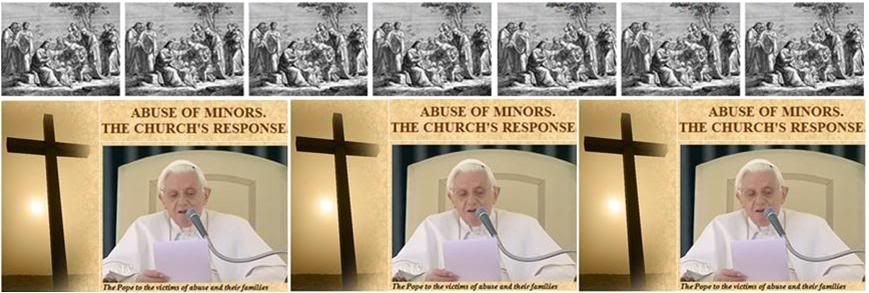 How unfortunate that the Vatican's #2 man himself should have been the source of what amounts to 'friendly fire' in the currently pitched battle of the new 'clash of civilizations' (it amounts to a war declared by secularism against Roman Catholicism which represents the strongest continuing force for genuine civilization in the world!)
How unfortunate that the Vatican's #2 man himself should have been the source of what amounts to 'friendly fire' in the currently pitched battle of the new 'clash of civilizations' (it amounts to a war declared by secularism against Roman Catholicism which represents the strongest continuing force for genuine civilization in the world!)
Today, Fr. Federico Lombardi had to issue the following statement:
STATEMENT TO CLARIFY
CARDINAL BERTONE'S REMARKS

In response to questions from newsmen on the debate that followed a statement by the Cardinal Secretary of State in Chile on the subjext of sexual abuses committed by priests against minors, the Director of the Vatican Press Office said:
"Ecclesiastical authorities do not consider it their competence to make general statements with a specifically psychological or medical nature, for which they defer naturally to the studies of specialists and the ongoing research on the subject.
"With regard to the competence of ecclesiastical authorities, on the causes of sexual abuses committed by priests and confronted in recent years by the Congregation for the Doctrine of the Faith, we have the statistical data cited in the interview with Mons. (Charles) Scicluna which shows [that in such crimes], only 10% are cases of pedophilia [unnatural sexual attraction to children] , wehreas 90% of cases are properly ephebophilia (involving adolescents not children), of which 60% take place between the same sex and 30% are heterosexual. These data refer, of course, to sexual abuses committed by priests, not to the general population."
 |
| |
 14/04/2010 17:18 14/04/2010 17:18 |
|
| | | OFFLINE | | Post: 19.933
Post: 2.574 | Registrato il: 28/08/2005
Registrato il: 20/01/2009 | Administratore | Utente Veteran | |
|
 GENERAL AUDIENCE TODAY:
GENERAL AUDIENCE TODAY:
Benedict starts special catechetical
cycle on the priestly ministry
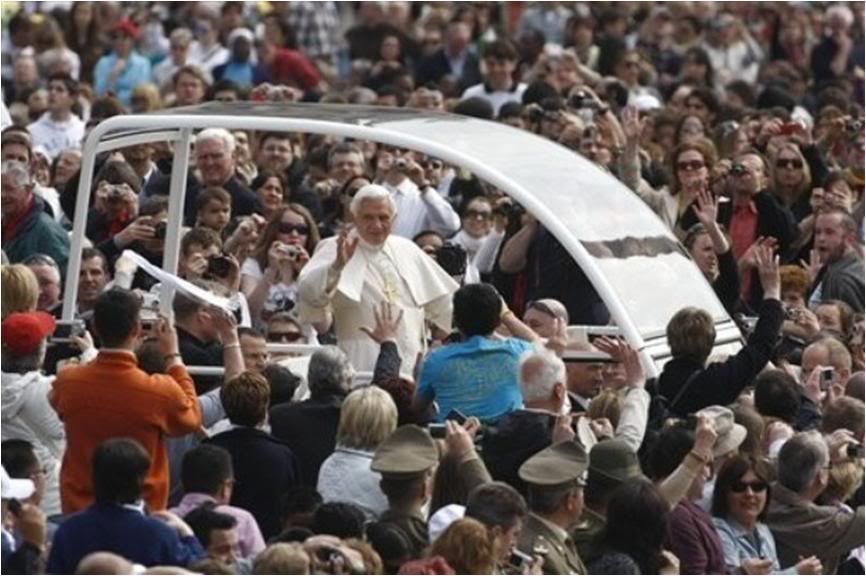 The Italian news agencies say at least 35,000 were in St. Peter's Square today for the General Audience - more than twice the 16,000 tickets that the Pontifical Household gave out.
The Italian news agencies say at least 35,000 were in St. Peter's Square today for the General Audience - more than twice the 16,000 tickets that the Pontifical Household gave out.
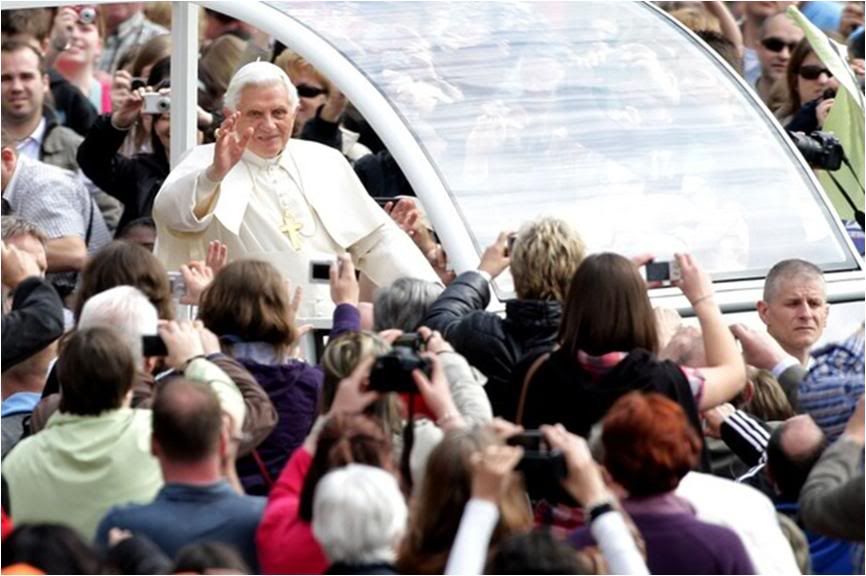
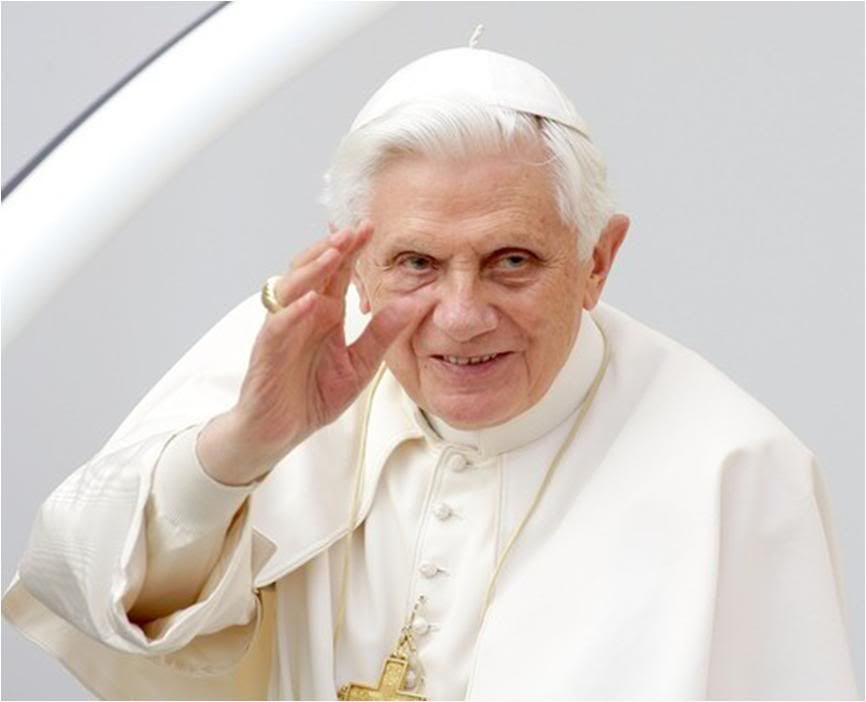
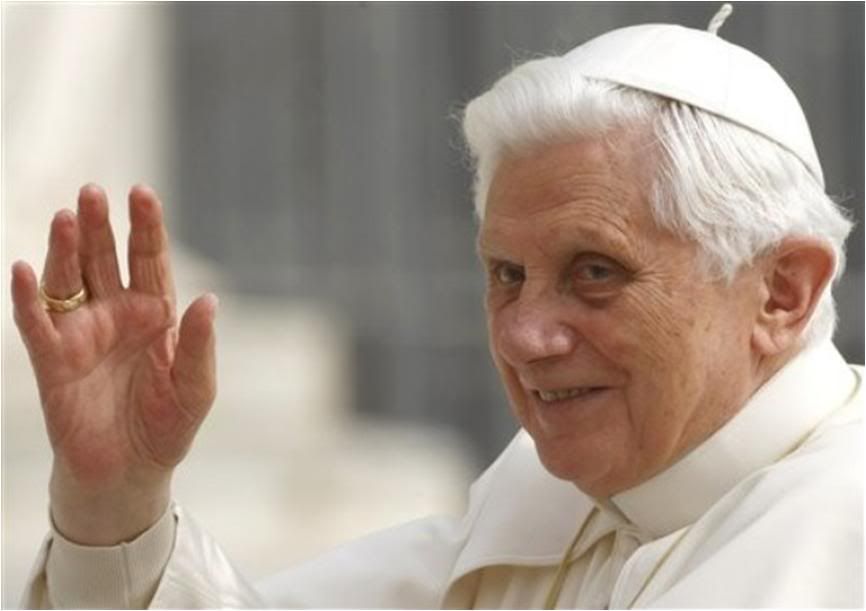
Pope Benedict XVI chose today to start a special catechetical cycle on the priesthood. Here is what he said in English:
As the Year for Priests draws to its close, I would like to devote the catecheses of this Easter season to a series of reflections on the ordained ministry.
I wish to speak in particular of the priest’s configuration to Christ, the head of the Church, through the exercise of the three munera [duties] of teaching, sanctifying and governing. In their ministry priests act in persona Christi, "in the person of Christ".
The three munera are in fact actions of the Risen Christ, who even today, through his priests, continues to teach, sanctify and govern his Church.
The first of the three munera is that of teaching, so important for our times. The priest is called to preach and teach not himself, but Jesus Christ and his revelation of the Father. This teaching, far from an abstract doctrine, is a living proclamation of the person of Christ, who is himself Truth, the source of our joy, peace and spiritual rebirth.
The priest’s munus docendi [teaching duty] demands that his whole life testify to the truth of the message that he proclaims, in harmony with the apostolic tradition and often in opposition to the spirit of the dominant culture.
Following the example of the great Curé of Ars, may every priest proclaim Christ faithfully and speak in such a way that all can hear in him the voice of the Good Shepherd.
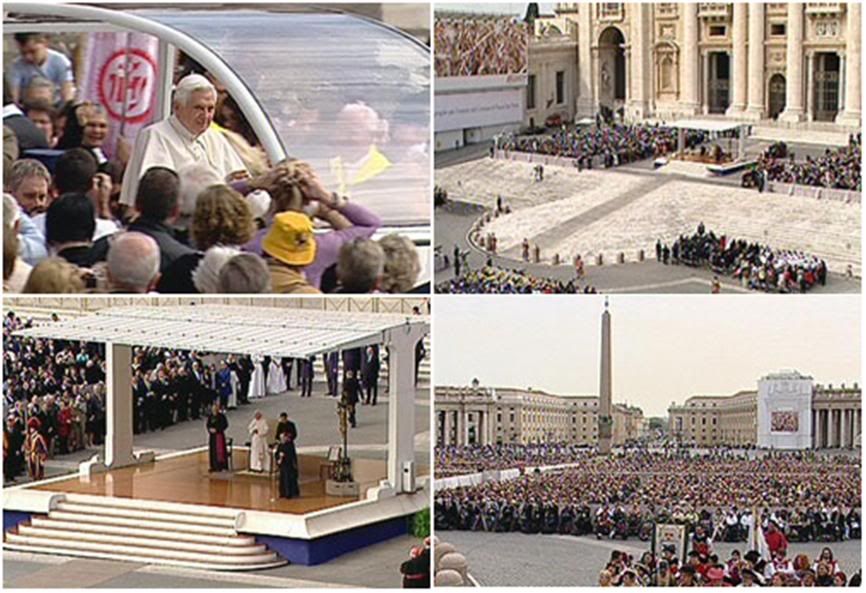
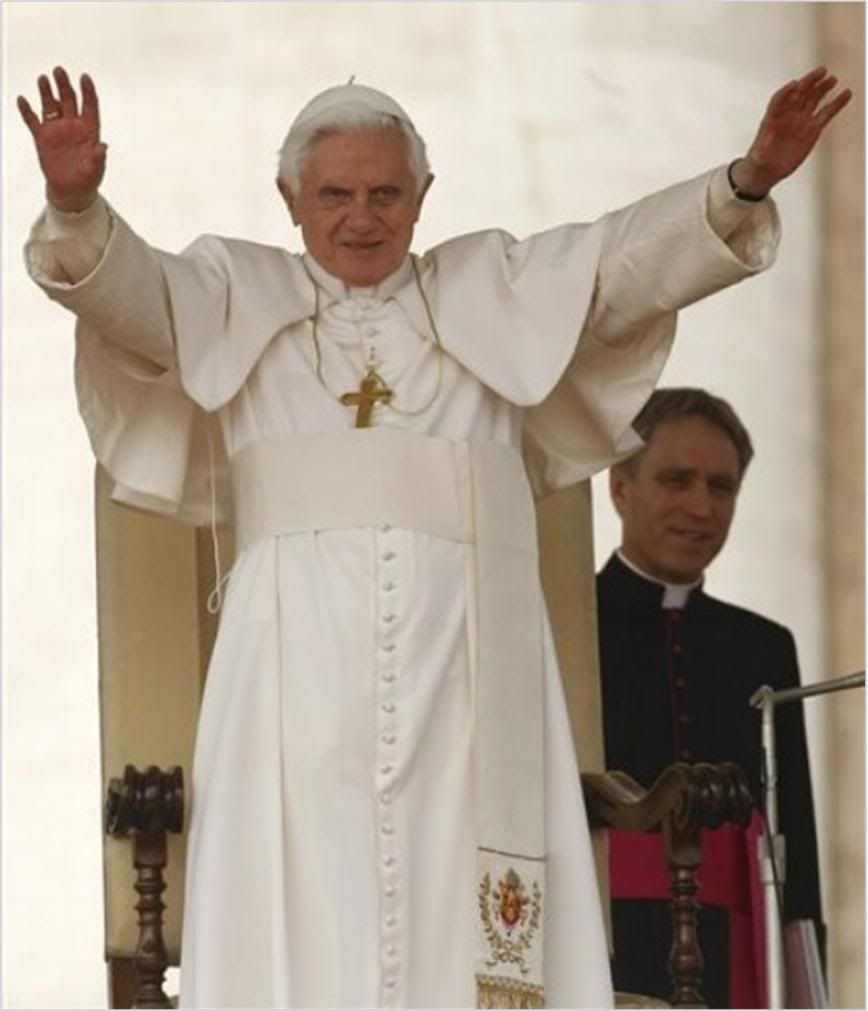
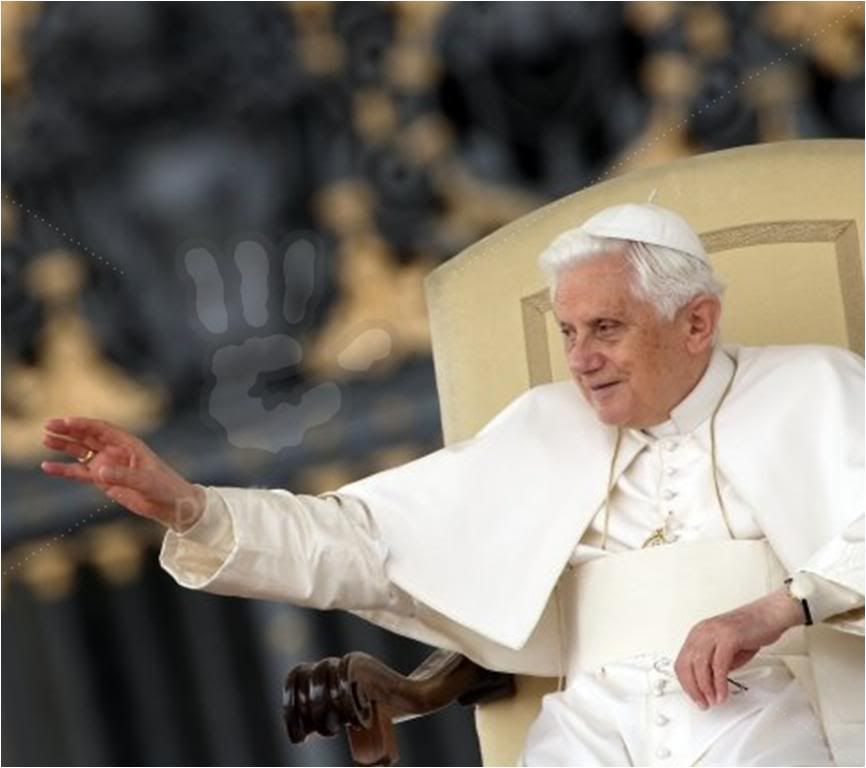
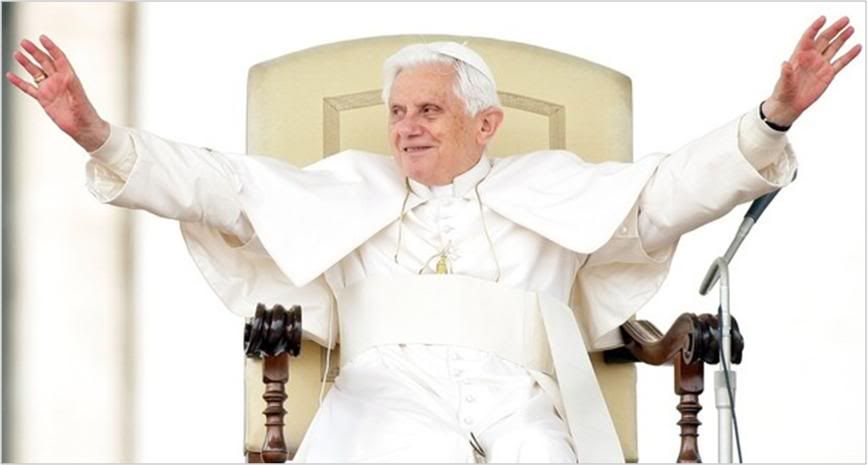
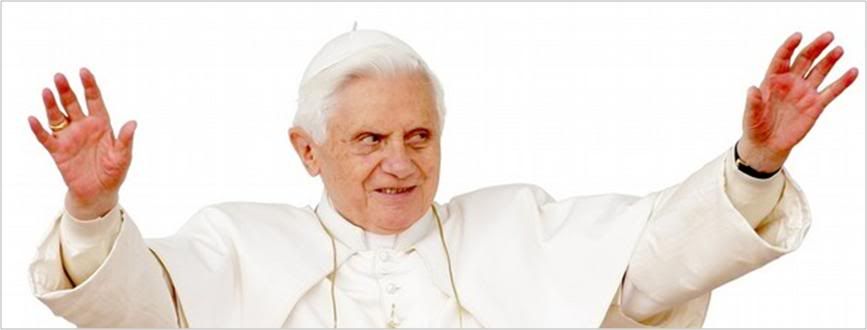

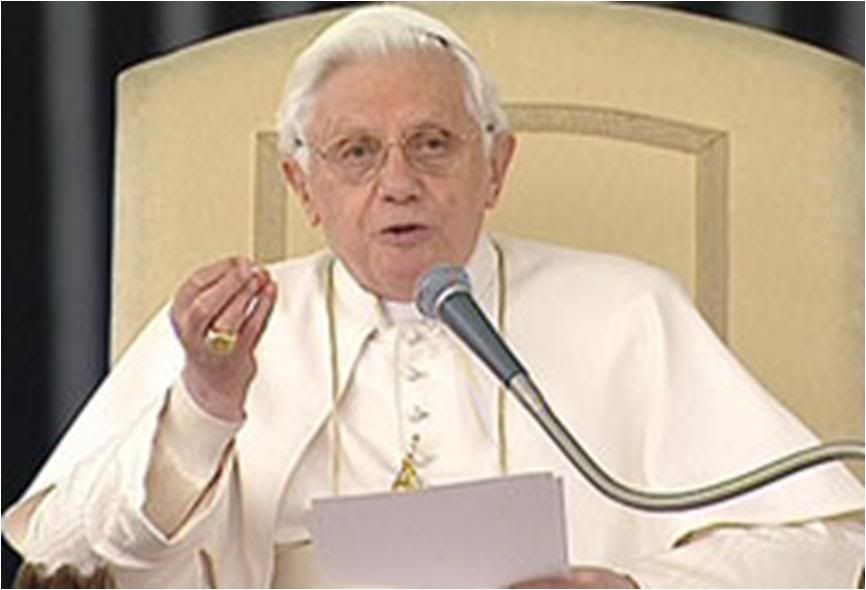
Dear friends,
In this Easter time that brings us to Pentecost and also to celebrating the closing of the Year for Priests on June 9,10 and 11, I would like to dedicate more reflection to the subject of the ordained ministry, dwelling this time on the fecund reality of the priests's configuration to Christ the Head, in the exercise of the three duties (munera) that he receives - namely, the three functions of teaching, sanctifying and governing.
In order to understand what it means to be 'in persona Christi capitis' - in the person of Christ the Head - on the part of the priest, and to understand also what consequences derive from the task of representing the Lord, especially in the exercise of these three functions.
It is necessary to clarify above all what is meant by 'representation'. The priest represents Christ. What does it mean to 'represent' someone? In common speech, it generally means to receive authority from a person to be able to be present in his place, speak and act in his place, when he who is represented is absent from the concrete action.
We ask ourselves: Does the priest represent the Lord in the same way? The answer is No, because in the Church, Christ is never absent - the Church is his living Body, and he is the Head of the Church, present and operating in her.
Christ is never absent - rather, he is present in a way that is completely free from the limitations of space and time, thanks to the event of the Resurrection which we contemplate in a special way during this Eastertide.
Therefore, the priest who acts in persona Christi Capitis [in the person of Christ the Head] and in representation of the Lord, never acts in the name of an absentee, but in the Person of the Risen Christ himself, who is rendered present through his truly effective action.
He acts and makes real that which the priest cannot do: the consecration of the bread and wine so that the presence of the Lord is real, the absolution of sins. The Lord makes his own action present in the person who carries out these gestures.
These three tasks of the priest - which Tradition has identified in the words of the Lord's own mission - to teach, to sanctify and to govern - in their disticntion and in their profound unity, are a specification of this effective representation. They are, in fact, the three actions of the risen Christ, the same that today, in the Church and the world, teaches and therefore creates faith, reunites his people, creates the presence of truth, and truly builds the communion of the universal Church; and sanctifies, and leads.
The first task that I wish to speak of today is the munus docendi, namely, the duty to teach. Today, in the middle of an educational emergency, the Church's duty to teach, exercised concretely though the ministry of each priest, is particularly important.
We live in great confusion over the fundamental choices in our life and the questions on what the world is, where did we come from, where are we going, what should we do in order to do good, how should we live, what are the values that are really pertinent.
About all this, there exist so many conflicting philosophies that arise and die, creating a confusion about those fundamental choices - how to live - because we no longer know, generally, of what and for what we were made, and where we are going.
In this situation, the Word of the Lord is realized, when he expressed compassion for the crowd because they were like sheep without a shepherd (cfr Mk 6,34). The Lord made this observation when he saw the thousands of persons who followed him to the desert because, in the diversity of currents at that time, they no longer knew the real sense of Scripture, what God said.
The Lord, moved by compassion, interpreted the Word of God, he himself is the Word of God, and thus he gave them orientation. This is the function in persona Christi of the priest: to make present, in the confusion and disorientation of our times, the light of the Word of God, the light that is Christ himself in our world.
Thus the priest does not teach his own ideas, nor a philosophy that he has invented himself, that he has found or that he likes. The priest does not speak of himself, does not speak for himself, nor to gain admirers perhaps, or his own game. He does not say things of his own, his own inventions, but in the confusion of all the philosophies, the priest teaches in the name of Christ who is present, he offers the truth which is Christ himself, his word, his way of living and moving forward.
For the priest, what Christ said of himself is valid: "My doctrine is not mine" (Jn 7,16). Christ did not offer himself, but as the Son, he is the voice, the word of the Father. Even the priest should always say and do the same: "My doctrine is not mine, I am not propagating my ideas or what pleases me. I am the mouth and heart of Christ and I make present this one and common doctrine which created the universal Church and which creates eternal life".
This fact, namely, that the priest does not invent, does not create and does not proclaim his own ideas since the doctirne he announces is not his, but Christ's, does not mean, on the other hand, that he should be neutral, like a spokesman who reads a text which perhaps is not his own.
Even in this case, the model of Christ is valid, who said: "I am not of myself and I do not live for myself, but I come from the Father and I live for the Father." Thus, in this profound identification, the doctrine of Christ is that of the Father, and he himself is one with the Father.
The priest who announces the word of Christ, the faith of the Church, and his own ideas, should also say: "I do not live of myself nor for myself, but I live with Christ and from Christ, and therefore whatever Christ told us become my words even if they are not mine."
The life of the priest should identify itself with Christ and in this way, the words that are not really his nonetheless become profoundly personal. St. Augustine, on this subject, speaking of priests, said: "And we, what are we? Ministers [of Christ], his servants; because what we distribute to you is not ours, but something we draw out from his cupboard. Even we live from it, because we are servants like you" (Discorso 229/E, 4).
The teaching that the priest is called on to offer, the truth of the faith, should be internalized and lived in an intensely personal spiritual way, so that the priest enters into a profound interior communion with Christ himself.
The priest believes, he accepts, and seeks to live, first of all,just as the Lord has taught and the Church has transmitted, in that process of identifying with one's ministry of which St. Jean Marie Vianney was the exemplary witness (cfr Letter to decree the Year for Priests).
"United in the same charity," St. Augustine further affirms, "we are all listeners to him who is the one Master in heaven" (Enarr. in Ps. 131, 1, 7).
The voice of the priest, consequently, can seem not uncommonly "the voice of one who cries in the wilderness" (Mk 1,3), but it is precisely in this that his prophetic power consists of: in not being ever homogenized nor homogenizable to any dominant culture or mentality, but in showing the only novelty that is capable of working an authentic and profound renewal of man - namely, that Christ is the Living One, he is the God near us, the God who works in the life and for the life of the world, and who gives us the truth of how to live.
In the careful preparation of the sermon on feast days, without excluding that on weekdays, in the effort at catechetical training in schools, in academic institutions, and in a special way, through that unwritten book which is his own life, the priest is always a 'professor' - he teaches.
But not with the presumption of one who imposes his own truths, rather with the humble and joyful certainty of he who has encountered the Truth, who has been gripped and transformed by it, and can therefore do no less than to announce it.
In fact, no one can choose the priesthood for himself, it is not a way to achieve any security in life, or to conquer a social position. No one can give it to himself nor seek it by himself. The Priesthood is a response to the call of the Lord, to his will, in order to become anoouncers not of one's personal truth but of his truth.
Dear brother priests, the Christian people ask to hear from our teachings the genuine doctrine of the Church through which they can renew the encounter with Christ who gives joy, peace, salvation.
Sacred Scripture, the writings of the Fathers and Doctors of the Church, the Catechism of the Catholic Church, constitute, in this respect, references that are indispensable in the exercise of the munus docendi, so essential for conversion, the journey of faith and the salvation of men.
Priestly ordination means: to be immersed... in the Truth (Homily at the Chrismal Mass, April 9, 2009) - that truth which is not simply a concept or an ensemble of ideas to transmit and to assimilate, but which is the Person of Christ, with whom, for whom, and in whom we live and thus, necessarily, also gives rise to the actuality and comprehensibility of the announcement.
Only this consciousness of the Truth become Person in the Incarnation of the Son justifies the missionary mandate: "Go into the whole world and proclaim the gospel to every creature" (Mk 16,15). Only if it is the Truth which is destined for every creature, if it is not an imposition of something, but an opening of the heart to that for which it was created.
Dear brothers and sisters, the Lord has entrusted to priests a great task: to be announcers of his Word, of the Truth that saves; to be his voice in the world to bring that which serves the true good of souls and the authentic path of faith (cfr 1Cor 6,12).
May St Jean Marie Vianney be an example for all priests. He was a man of great wisdom and heroic strength in resisting the cultural and social pressures of his time in order to lead souls to God: Simplicity, fidelity and immediacy were the essential characteristics of his preaching, the transparency of his faith and his holiness.
The Christian people were edified by him, and as with other authentic teachers in every age, they recognized in him the light of Truth. They recognized in him most decisively what must always be recognized in a priest: the voice of the Good Shepherd.
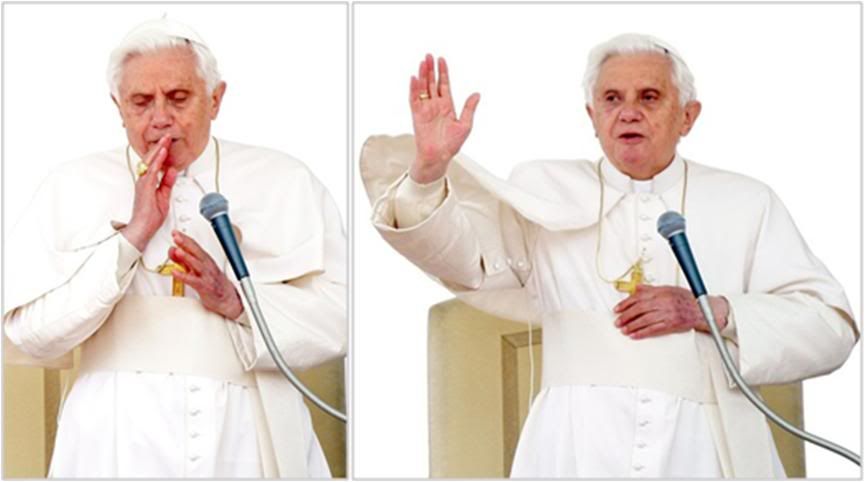
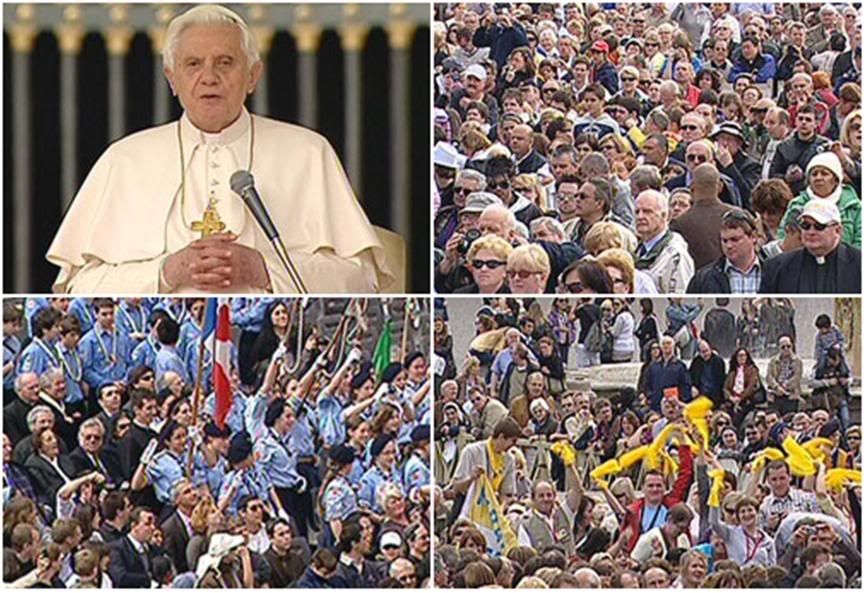
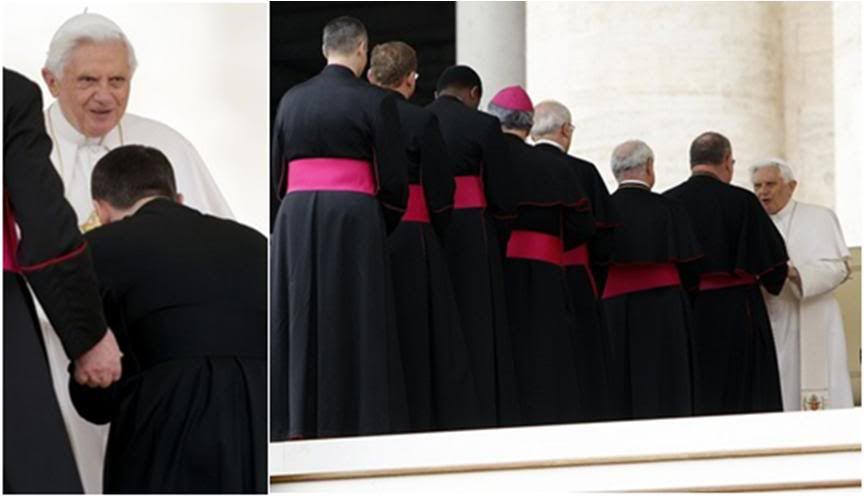
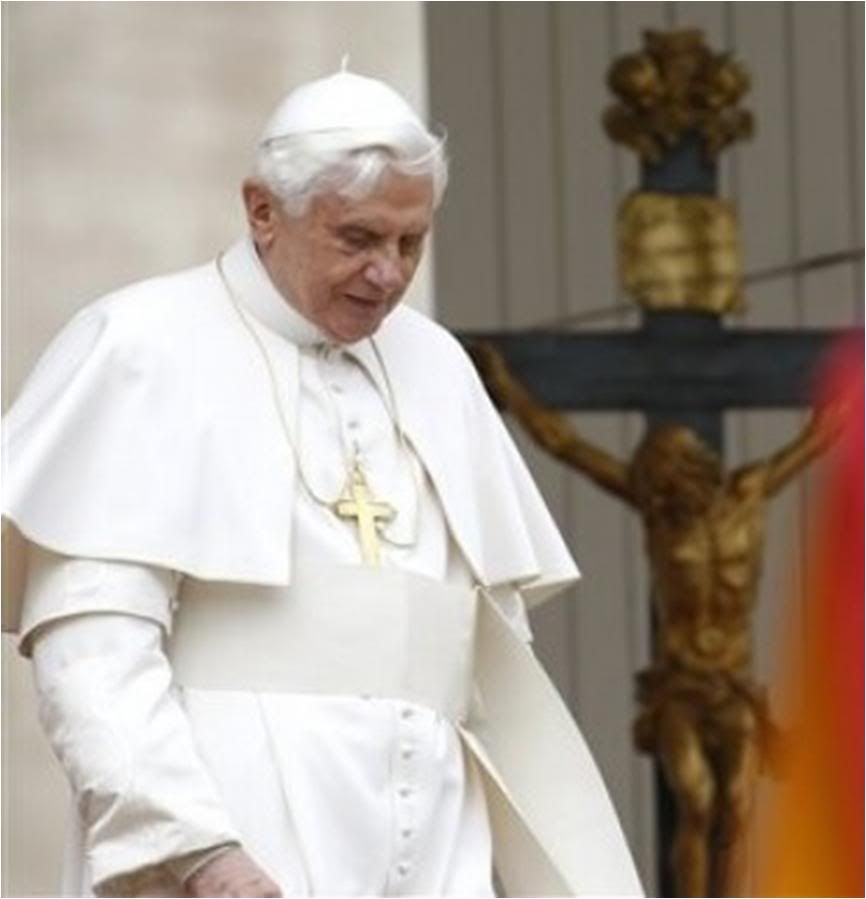
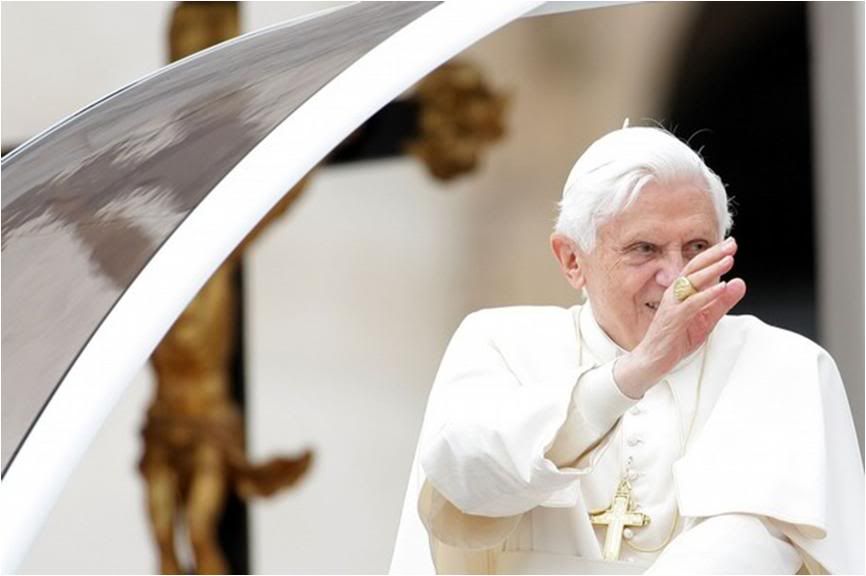
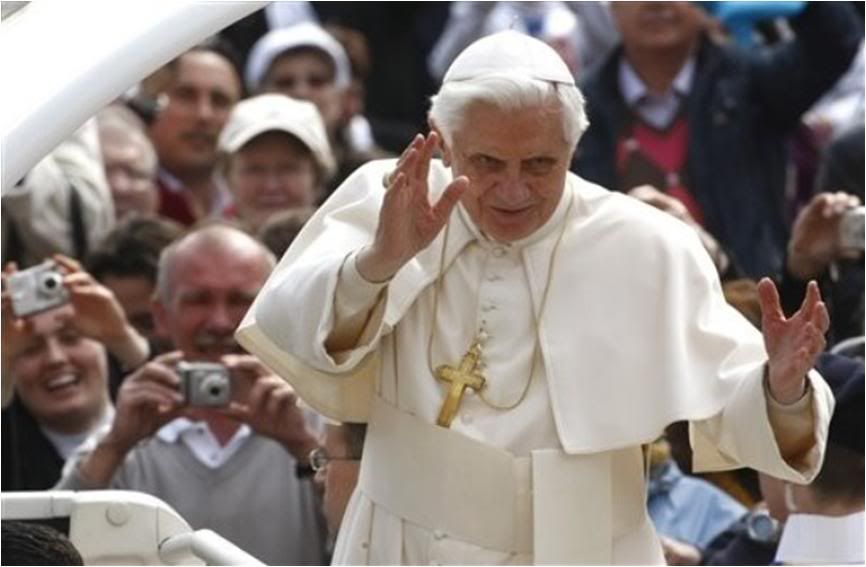
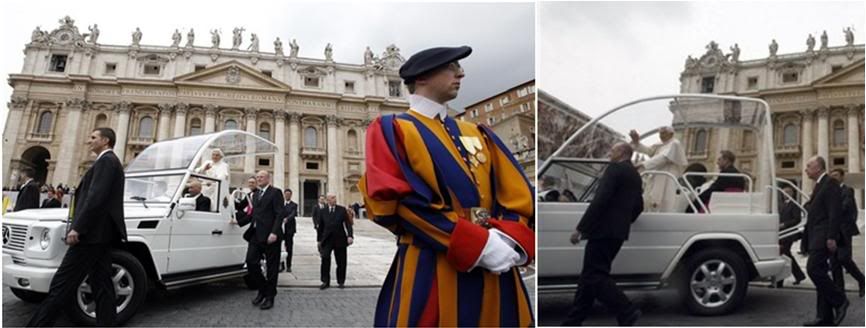 How can you not love our Holy Father who had the most disarming reply today to his critics - certainly not 'disarming' for them, especially since they will probably ignore it completely - but nonetheless giving the faithful, and most especially, his priests, a beautiful catechesis on what it means for a priest to be in persona Christi, the heroic but nonetheless privileged challenge to all who consecrate their life in the service of God and the Church.
Those who prefer to 'see no good, hear no good, speak no good' about the Pope and the Church have been bleating out in their headlines that the Pope has been 'silent' about the issue - conveniently ignoring his epochal Letter to the Catholics of Ireland, and statements worked into his homilies, catecheses, and Sunday messages all this time.
How can you not love our Holy Father who had the most disarming reply today to his critics - certainly not 'disarming' for them, especially since they will probably ignore it completely - but nonetheless giving the faithful, and most especially, his priests, a beautiful catechesis on what it means for a priest to be in persona Christi, the heroic but nonetheless privileged challenge to all who consecrate their life in the service of God and the Church.
Those who prefer to 'see no good, hear no good, speak no good' about the Pope and the Church have been bleating out in their headlines that the Pope has been 'silent' about the issue - conveniently ignoring his epochal Letter to the Catholics of Ireland, and statements worked into his homilies, catecheses, and Sunday messages all this time.
That he has chosen to interruupt his catechetical cycle on the Christian thinkers of the Middle Ages to devote a special cycle to the priestly ministry is poignantly eloquent proof of how much he has the sanctity of priesthood so close to his heart - after all, it is the ideal that he has sought to live up too since he himself became a priest. What better ideal than to seek to be worthy of being 'in persona Christi'?
GRAZIE DI CUORE, SANTITA, PADRE NOSTRO, DOLCE CRISTO IN TERRA!
P.S. If MSM pick this catechesis up at all, it will be to say "Oh, yes, he spoke all about how priests should be like Christ, but again, he never mentioned sexual abuse!" PUH-LEEEEEZZZZ!
The best revenge is living well - and looking gorgeous, in a way your detractors will never be!
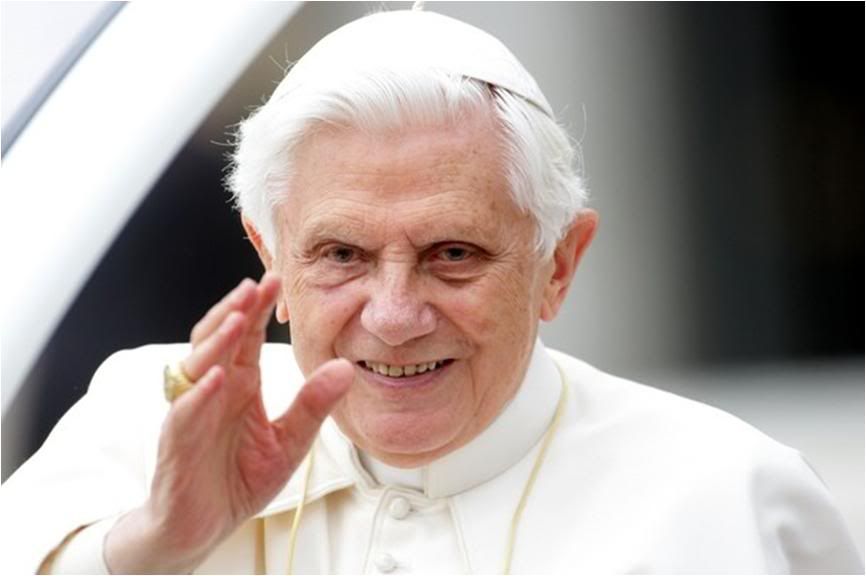
Benedict XVI at the GA today, two days before he turns 83!
[Modificato da TERESA BENEDETTA 15/04/2010 15:14] |
| |
 14/04/2010 18:33 14/04/2010 18:33 |
|
| | | OFFLINE | | Post: 19.934
Post: 2.575 | Registrato il: 28/08/2005
Registrato il: 20/01/2009 | Administratore | Utente Veteran | |
|
 Don't know about 'badly needed' but love begets love, both ways, and the physical presence of the Holy Father - loving, paternal, warm-hearted and radiating hoy - always calls forth an affectionate, usually enthusiastic, response from the crowd if they did not already have it before!
Malta to give badly-needed
Don't know about 'badly needed' but love begets love, both ways, and the physical presence of the Holy Father - loving, paternal, warm-hearted and radiating hoy - always calls forth an affectionate, usually enthusiastic, response from the crowd if they did not already have it before!
Malta to give badly-needed
support for Pope Benedict
by Herman Grech

Valletta, Malta, April 14 (dpa) - When Pope Benedict XVI's visit to Malta was announced in January, the first reader's post on the popular online forum timesofmalta.com rejoiced: "Yippee. Fresh asphalt."
The Maltese know too well that it takes a papal intervention to get the authorities to fix many of the island's disastrous roads.
The tiny island nation is being spruced up to welcome the Pontiff for a two-day visit on April 17, his first trip abroad in 2010.
The last papal visit to Malta, that of John Paul II, took place in 2001. Since then, the country, staunchly Catholic for centuries, has experienced a remarkable culture shift.
European Union membership in 2004, has opened borders and minds. Secularism is now ingrained, and minority groups have earned a voice.
The sex abuse claims rocking the Catholic Church has been on everyone's lips in Malta and some have questioned the "ill-timing" of the Pope's visit. [Look how they turn things around! This papal visit was planned months in advance! The 'ill timing' is in the
But the feeling on the ground is the Pope will still be given a very warm welcome, quite possibly the show of support he so badly appears to needs at the moment.
Anthropologist and opinion writer Mark Anthony Falzon is not surprised.
"Especially in southern Europe I think, Catholics have a knack of combining the most virulent type of anti-clericalism with a long-term loyalty and devotion to the Church. It's the mother of all ambiguities, but it's very much alive," Falzon said.
The presence of the faith bestowed to the island by St Paul in 60 AD is ubiquitous - there are 359 churches spread over the 316-square kilometre island.
In recent years, however, the conservative Maltese church has experienced some rifts.
An outspoken 81-year-old priest, Monsignor Charles Vella, who in the 1950s pioneered marriage counselling services, last summer shocked the clergy when he said Malta should not fear the introduction of divorce. Along with the Philippines, Malta remains the only country with no divorce legislation.
"I wonder what kind of imprint he (Benedict) will leave when he flies back to the troubled Vatican," Vella said.
"I hope Malta will raise his spirits and heal what he called his wound, but I wonder what will be the follow-up. It took St Paul three months after his shipwreck to evangelize Malta. After the three-day visit of Pope John Paul II there was hardly any follow-up and I only hope this time by some miracle it will not be just another festa (feast)," Vella added.
Still, whatever spirituality Benedict may be hoping to reinforce when he visits, there will be no escape from the sexual scandal which has hit the Vatican.
One man who intends to remind the Pope about the abuse revelations is Lawrence Grech, who claims to have been sexually molested by priests in a Maltese orphanage.
The 37-year-old Grech said the Pope should use his trip to Malta to apologize to local victims of child abuse.
Grech is one of 10 witnesses testifying behind closed doors in a case in Malta against three alleged predator priests. Proceedings have been going on for seven years.
The Maltese Church has received reports of child abuse involving 45 priests since 1999, but it is not clear how many of the priests investigated had been found guilty.
Two weeks ahead of Benedict's planned visit,the Church reiterated calls on victims to come forward and report cases of alleged abuse.
Malta's Archbishop Paul Cremona admitted the Church is currently experiencing a "very sorrowful moment".
The Maltese Church would stand by the Pope in decrying the horror of the abuse of minors, especially because it was carried out by priests, the popular archbishop told the German Press Agency dpa.
"It will also stand by the victims of these acts. We will follow also the Pope's call to purify the Church from this scandal ... While doing this it will also condemn all the accusations that are being leveled unjustly at His Holiness," Cremona said.
Though the voices of dissent in Malta are growing louder many still stand by the Church.
When disgraced US congressman Mark Foley accused a Maltese priest in 2006 of molesting him as a child, many islanders rallied around the cleric and shooed off reporters waiting outside his home.
A recent poll showed that while 90 per cent of the Maltese believe in God and follow the Catholic religion, a majority is departing from the Church's teachings on issues like contraception, papal infallibility and the afterlife.
The survey showed a majority in favour of divorce, and 20 per cent said they felt "alienated" by Benedict. Yet, many of the respondents are likely to unite in cheering the Pontiff during his 24-hour visit.
|
| |
 14/04/2010 18:58 14/04/2010 18:58 |
|
| | | OFFLINE | | Post: 19.935
Post: 2.576 | Registrato il: 28/08/2005
Registrato il: 20/01/2009 | Administratore | Utente Veteran | |
|

 Papal secretary marks Pope's
Papal secretary marks Pope's
anniversary with a book
by CINDY WOODEN

VATICAN CITY. April 14 (CNS) - Pope Benedict XVI isn’t the only resident of the Apostolic Palace involved in writing and publishing.
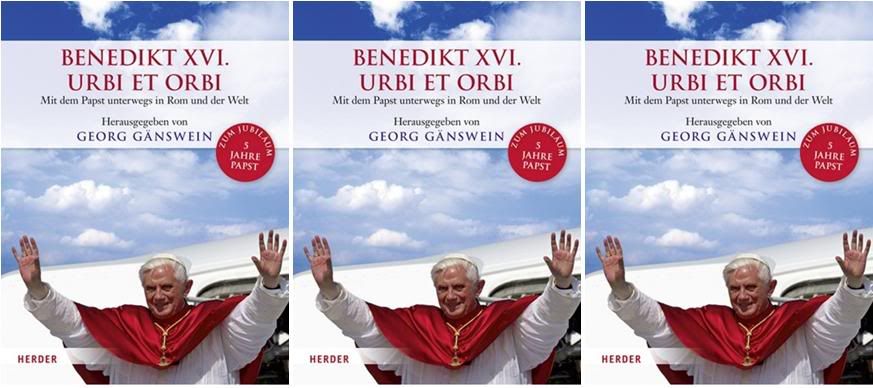
After having collaborated on children’s books about Pope Benedict XVI, Msgr. Georg Ganswein — his personal secretary — is celebrating the fifth anniversary of the Pope’s election with his own book, “Benedict XVI: Urbi et Orbi,” looking at the Pope’s public encounters with the faithful and with other visitors in Rome and around the world.
On all the trips and at each encounter, Msgr. Ganswein has had a front-row seat. But it’s not a tell-all book by any stretch of the imagination. Its 90-odd pages are filled with photographs and quotes from papal speeches, along with brief introductory notes from the papal secretary.
A joint project of the Vatican publishing house and Germany’s Verlag Herder, the book was distributed to journalists yesterday. So far, it is available only in Italian and German.
The main focus is on Pope Benedict’s trips abroad, but there also are pages dedicated to his visits to Rome parishes and Catholic charitable agencies and to cities throughout Italy.
Describing the Pope’s April 2008 visit to the United States, Msgr. Ganswein said the Pope arrived “in a country deeply wounded and suffering.”
“What would Benedict XVI say about the sexual abuse of minors by churchmen? What would he say at Ground Zero where the Twin Towers stood before a terrorist attack cut them down, causing the deaths of thousands of people?” Msgr. Ganswein asked.
“The Pope was not afraid of calling the incomprehensible by name. He met privately with the victims of sexual abuse, and at the place where thousands died, he did not speak of vengeance, but of forgiveness,” the secretary wrote.
Msgr. Ganswein ends the book with an essay titled, “The End of a Trip is the Eve of Another.” He points out that the Pope is going to Malta this weekend, to Portugal May 11-14, to Cyprus June 4-6, to England and Scotland Sept. 16-19; and to Spain Nov. 6-7.
He said that just as thousands of people want to come to Rome to meet the Pope, the Pope wants to travel to meet them.
“As Catholics even those who are not fortunate enough to meet the Pope personally have the privilege of belonging — together with the Successor of Peter — to a worldwide community, which although not perfect, for 2,000 years has proclaimed in every tongue the good news that God loves humanity and that death does not have the last word, because that belongs to God, who is full of love for us.”
As for book writing, Msgr. Ganswein repeated what has been reported several times: the second volume of Pope Benedict’s book on Jesus of Nazareth “will appear soon".
 I fear that those who have taken a pathological dislike of Mons Gaenswein for whatever reason will see this as yet another of what they claim to be his 'publicity-seeking' as they have said of the interviews he has given about the Holy Father. Surely, they cannot believe that he is doing all this without the knowledge and authorization of his 'boss'.
I fear that those who have taken a pathological dislike of Mons Gaenswein for whatever reason will see this as yet another of what they claim to be his 'publicity-seeking' as they have said of the interviews he has given about the Holy Father. Surely, they cannot believe that he is doing all this without the knowledge and authorization of his 'boss'.
This book, in particular, which I thought from reading the German blurbs yesterday, was purely a Herder initiative, turns out to be a joint venture with the Vatican publishing house. Herder is, of course, the German publisher of many books by Joseph Ratzinger/Benedict xVI, including the all-important COLLECTED WORKS and JESUS OF NAZARETH.
BTW, as much as the media report how 'little support' Benedict XVI has among his fellow Germans, it seems there are more than enough of them to keep quite a few German publishers merrily going with a sub-industry in Ratzinger/B16 books. Herder alone has come out with about 4 books recently about the Pope or about his thought and Magisterium!
 BILD today features an interview with German collage artist Jens Lorenzen, 49, who lives and works in Berlin, and decided that for the Pope's first lustrum [I think I will start using the term instead of 5-year anniversary - lustrum, from lustrare and its double sense of 'purify' and 'brighten', so appropriate to celebrate our beloved Papino's anniversary], he was going to print 99 copies of a giant lithograph of BILD's iconic April 20,2005 WIR SIND PAPST headline. He was to present one to Pope Benedict at today's GA.
BILD today features an interview with German collage artist Jens Lorenzen, 49, who lives and works in Berlin, and decided that for the Pope's first lustrum [I think I will start using the term instead of 5-year anniversary - lustrum, from lustrare and its double sense of 'purify' and 'brighten', so appropriate to celebrate our beloved Papino's anniversary], he was going to print 99 copies of a giant lithograph of BILD's iconic April 20,2005 WIR SIND PAPST headline. He was to present one to Pope Benedict at today's GA.
I don't have time now to translate the interview with Lorenzen, but he is a Christian and says he reads the Bible every day. He says of God that "you don't find him - he makes himself known to you, and I had that experience".
A headline becomes
an icon of pop art

April 14, 2010
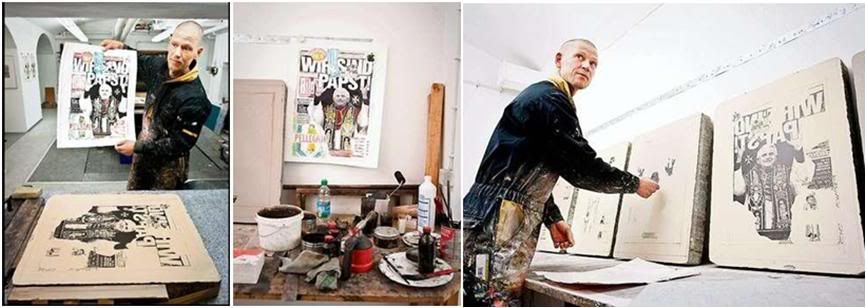 Lorenzen uses newspaper clippings, advertisements and photos for his collages. For the Pope collage, he says he chose the secondary elements from media clippings that had to do with Christ or Christianity.
Lorenzen uses newspaper clippings, advertisements and photos for his collages. For the Pope collage, he says he chose the secondary elements from media clippings that had to do with Christ or Christianity.
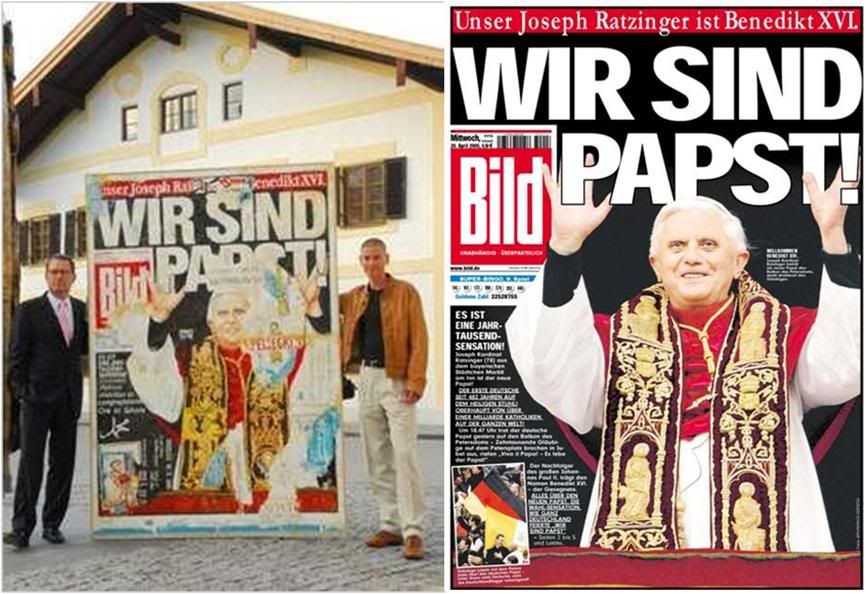 In 2007, Lorenzen posed with BILD editor Kai Diekmann (left) with his lithograph in front of the Pope's birth house in Marktl.
In 2007, Lorenzen posed with BILD editor Kai Diekmann (left) with his lithograph in front of the Pope's birth house in Marktl.
[Modificato da TERESA BENEDETTA 27/12/2010 23:35] |
| |
 14/04/2010 20:43 14/04/2010 20:43 |
|
| | | OFFLINE | Post: 271
Post: 43 | Registrato il: 28/05/2007
Registrato il: 19/02/2009 | Utente Comunità | Utente Junior | |
|
Just on a personal note: I just signed up for all possible 'support the Pope' sites I could stumble across. I cancelled the local paper and subscribed to 'Die Tagespost' instead. Very good paper!!!
I've been trying to reason with people at work, at home, with friends, with neighbors and with fellow Catholics.
I have refused to watch the news. I have refused to listen to my fav. morning show on the Radio, which always structured my morning routine by it's rather structured layout. I had been listening to that station (B3 on BR) since I was 12!!. I can NOT take their anti Catholic bigotry - in Bavaria of all places!!! ![[SM=g8126]](https://im0.freeforumzone.it/up/0/26/3169140.gif)
We have a very young, nice Priest who is theologically sound and great with kids, but who is also helplessly overworked. Offering assistance is to him a granted thing.
I'm hyper excited about going to Rome in a few weeks! I even have Tom all fired up. I told him about the ludicrous 'arrest the Pope' thing.
He then made himself twice his already rather tall size and said: "I'm going to Rome, and if needed, I'll stay down there to show my support!"
I think he would sign up to a Papal Army/the Swiss Guard instantly!
Men... strange creatures. ![[SM=g6794]](https://im0.freeforumzone.it/up/0/94/2194462.gif)
***
Wonderful GA today - and it came straight from his heart.
Somebody had mentioned that the devil hates holiness - that's why this wonderful, humble, sweet, brilliant, beautiful man is being attacked with such velocity. I agree. Joseph Ratzinger oozes holiness from every pore;
![[SM=g9433]](https://im0.freeforumzone.it/up/0/33/2103559.gif) ![[SM=g9433]](https://im0.freeforumzone.it/up/0/33/2103559.gif)
it must be very painful for Satan to tolerate him as the successor of Peter!
Sorry for the rant... it was needed... thanks!
 Rant on, Heike, when it's needed. It's the way I feel, refusing to let one lie, half-truth, distortion, misrepresentation and sheer bias go unanswered (for my own peace of mind, at any rate), since I have to post some reports to keep track of what evil Satan's agents are currently brewing and spewing.
Rant on, Heike, when it's needed. It's the way I feel, refusing to let one lie, half-truth, distortion, misrepresentation and sheer bias go unanswered (for my own peace of mind, at any rate), since I have to post some reports to keep track of what evil Satan's agents are currently brewing and spewing.
But of course, I love it best when you rave about our dear, sweet, holy Papi whom nothing and no one can harm because...

Will you be in Rome before the trip to Portugal or after? Three cheers for Tom's fighting spirit! I'll experience it all vicariously afterwards when you get back and tell us all about it - with photos....Time flies. Friday, April 16, will be the second anniversary of the day I saw Papino in the flesh as close as 10 feet away in Washington, and twice on the same day. And then he was in New York, and oh, joy!... I still feel all the thrill....
Now that you are a Tagespost subscriber, maybe you can pass me on their articles... I used to get a lot of good material from them before they closed up to non-subscribers two years ago. They were always good for commentary and book reviews that had to do with JR/B16...
TERESA
[Modificato da TERESA BENEDETTA 14/04/2010 22:07] |
| |
 14/04/2010 23:16 14/04/2010 23:16 |
|
| | | OFFLINE | | Post: 19.936
Post: 2.577 | Registrato il: 28/08/2005
Registrato il: 20/01/2009 | Administratore | Utente Veteran | |
|
 Benedict's papacy has been remarkable!
Benedict's papacy has been remarkable!
By Carl Anderson

April 13, 2010
Mr. Anderson is the Supreme Knight of the Knights of Columbus and a New York Times bestselling author.
NEW HAVEN, CT, April 13 (Zenit.org) - In early April, the German Magazine Der Spiegel weighed into the recent attacks on the Church with the following headline: "The Failed Papacy of Benedict XVI."
Failed papacy? Not by a long shot.
Even by this world's standards, the papacy of Pope Benedict has been remarkable. He has led the Church forward with a focus on engaging the culture around us with love. His two encyclicals on charity, his encyclical on hope, and his letter on the Eucharist -- Christ at the center of our faith -- have taken us back to the most basic and profound message of Christianity -- faith, hope and charity. Benedict's Christianity is the Christianity of the Beatitudes.
The reason some see a "failed papacy" is that they want to see just that. Too many in Europe want to see this papacy fail -- any papacy fail -- because the Church stands counter to their secularist agenda.
What some cannot tolerate is the vision articulated in Pope Benedict's most recent encyclical, Caritas in Veritate, in which the Pope reminds us: "Without God man neither knows which way to go, nor even understands who he is" (No. 78).
This week we will hear the Gospel proclaimed in which Christ asks Peter, "Do you love me?" And Peter replies that he does. But he can only reply that he does because Christ has loved him first. The secularist turns his back on God´s love. He refuses Christ´s invitation to love him in return.
We should remember that the two great commandments of Christ are to love God wholeheartedly -- and our neighbor as ourselves. The first must lead to the second. But eliminate the first commandment -- love of God -- and the execution of the second -- love of neighbor -- will be unable to fulfill its promise.
The dream of the utopian secular society is a dream at best.
In Caritas in Veritate, Pope Benedict reiterated his point from Deus Caritas Est -- that no state would ever be so perfect as to eliminate the need for charity. He wrote: "When animated by charity, commitment to the common good has greater worth than a merely secular and political stand would have." (No. 7)
The idea that solutions to the world's problems are to be found in the Gospel not in secularism has long been a theme of this Pope. He has consistently maintained that the Church is different from secular society in that it does not seek a political messiah, but calls people to constant conversion.
A society that has no room for God -- and the media outlets of such a society -- also appear to have no room for this message, and so some have attacked the messenger, grasping at any straw to discredit him.
The Pope who has called us to charity in truth, who warned us that the economy would collapse if religious values were excluded from the marketplace, who did so much to address and put right the actions of those priests who have caused scandal -- this man has been targeted, because he believes that we can only authentically love our neighbor if we have first allowed God to love us.
That idea -- no matter how often it is proven correct by circumstance -- is something that some secular minds just cannot tolerate. So there is a rush to judgment, a jumping to conclusions, an attempt to discredit the {ope.
The champion of charity in truth has received neither charity nor truth at the hands of too many in the media.
There is a culture of suspicion against the Catholic Church today in which virtually any accusation is given credibility by the critics of the Church, while no amount of explanation in defense of the Church seems to be sufficient.
How else to explain the media frenzy now against the man who has done more than almost anyone else to deal effectively with those who abuse children?
The Holy Spirit will continue to lead Pope Benedict to the great work we have come to know him for, for his great witness to the love of Christ.
It is up to us today to follow our Pope´s witness. We must stand with Pope Benedict and say yes to Christ´s love, and then bring that love to our neighbor, to our society. We must evangelize by our witness.
The poor witness of a few -- their manipulation and abuse rather than love -- have been seized upon by some trying to discredit the authentic Christian message and way of life. This is why scandal is so harmful, but also why our witness today is so important.
Speaking in 2000, Cardinal Ratzinger said that the art of living "can only be communicated by one who has life -- he who is the gospel personified."
We must be that gospel personified, and in saying yes to Christ´s love, and yes to loving Christ, we must then extend authentic charity in truth to our neighbor. Then the world will see that we are Christians by the way we love one another -- and the way we will love one another will be the way we were first loved by God.
[Modificato da TERESA BENEDETTA 14/04/2010 23:18] |
| |
 15/04/2010 15:20 15/04/2010 15:20 |
|
| | | OFFLINE | | Post: 19.937
Post: 2.578 | Registrato il: 28/08/2005
Registrato il: 20/01/2009 | Administratore | Utente Veteran | |
|
 Thursday, April 15
Thursday, April 15
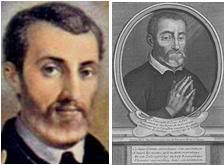 Blessed Cesar De Bus (France, 1544-1607)
Blessed Cesar De Bus (France, 1544-1607)
Jesuit, Founder of Fathers of Christian Doctrine
Born to wealthy parents, Cesar had a choice of careers before him - as a promising writer, or to join the army.
He chose the latter which also enabled him to be a royal courtier. In 1572, he fought with the French army in
the St. Bartholomew's Day massacre, which began with targeted assassination of French Protestant (Huguenot)
leaders and soon turned into mob violence by Roman Catholic groups, in which estimates of the dead ranged
from 5,000 to 30,000, It remains one of the most infamous of crimes imputed to Catholics. Inspired by the life
of St. Charles Borromeo, Cesar decided to become a priest, and was ordained in the Jesuit order in 1582. For
his apostolate, he chose to catechize villagers in out of the way places. This led him to found the Fathers of
Christian Doctrine in 1592 dedicated to family catechesis as a way to ward off heresy among the faithful. In
1666, five volumes of his 'Instructions for families' were published in Paris. St. Francis de Sales would later
call him 'a star of the first magnitude in the firmament of catechesis'. He was beatified in 1975, but his name
is still not included in any online list of Jesuit saints and blesseds, even those updated in 2010.
Readings for today's Mass:
www.usccb.org/nab/readings/041510.shtml
OR today.
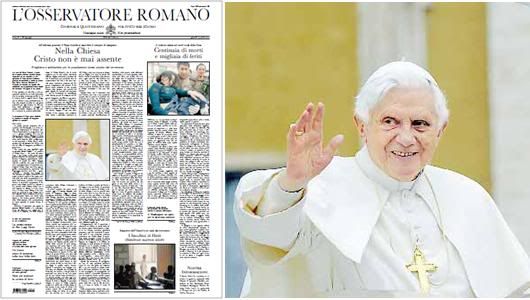
At the General Audience, the Pope reminds priests of their duties:
'Christ is never absent in the Church'
He expresses prayers and solidarity for the earthquake victims in China
Other Page 1 stories: A report on the magnitude 7 earthquake that struck part of the Tibetan plateau
early Wednesday; and a UNICEF report on the plight of hatian children three months after the earthquake.
In the inside pages, Cardinal Beertone's message of hope for the Chilean people as he ends an eight-day
visit, and a story on the 30th anniversary of the OR's monthly edition in Polish.
THE POPE'S DAY
The Holy Father began the day by offering Mass at the Pauline chapel
with the members of the Pontifical
Bibilical Commission meeting in Rome this week.
Later, he met with
- Cardinal Ivan Dias, Prefect of the Congregation for the Evangelization of Peoples
- Bishops of Brazil (North Sector, Group 2) on ad limina visit.
Later he met the whole entire delegation. Address in Portuguese.
[Modificato da TERESA BENEDETTA 15/04/2010 21:55] |
| |
 15/04/2010 17:07 15/04/2010 17:07 |
|
| | | OFFLINE | | Post: 19.938
Post: 2.579 | Registrato il: 28/08/2005
Registrato il: 20/01/2009 | Administratore | Utente Veteran | |
|
 George Weigel brings more light today to one of the issues I have often underscored during the current 'crisis'; and before that, in the general matter of the structure of the Church, particularly the autonomy of the local Churches, over whom the diocesan bishop really has full administrative control, and the insidious misreading of Vatican II by many bishops to mean that they can ignore the Pope's instructions for the Universal Church - such as Summorum Pontificum - and act on their own. What Mr. Weigel fails to underscore in citing Vatican II is the repeated statement in Vatican-II documents about the duty of the bishops to act "in communion with the Successor of Peter".
The limits of the papacy
George Weigel brings more light today to one of the issues I have often underscored during the current 'crisis'; and before that, in the general matter of the structure of the Church, particularly the autonomy of the local Churches, over whom the diocesan bishop really has full administrative control, and the insidious misreading of Vatican II by many bishops to mean that they can ignore the Pope's instructions for the Universal Church - such as Summorum Pontificum - and act on their own. What Mr. Weigel fails to underscore in citing Vatican II is the repeated statement in Vatican-II documents about the duty of the bishops to act "in communion with the Successor of Peter".
The limits of the papacy


April 14, 2010
During the preparation of the Second Vatican Council’s Dogmatic Constitution on the Church, Pope Paul VI proposed that the constitution’s discussion of papal primacy include the affirmation that the Pope is “accountable to the Lord alone.”
This suggestion was rejected by the Council’s Theological Commission, which wrote that “the Roman Pontiff is also bound to revelation itself, to the fundamental structure of the Church, to the sacraments, to the definitions of earlier councils, and other obligations too numerous to mention.” Pope Paul quietly dropped his proposal.
Yet the image persists that the Catholic Church is a kind of global corporation, with the Pope as CEO, the bishops as branch managers, and your parish priest as the local salesman. And according to that image, the Pope not only knows what’s going on all the way down the line, he gives orders that are immediately obeyed all the way down the line.
Or, to vary the misimpression, the Church is like the United States Marine Corps — there, at least according to legend - when the Commandant issues an order, everyone from the highest-ranking four-star to the lowliest Parris Island recruit staples a salute to his forehead and does what he’s told.
This distorted and distorting image of the Pope as dictatorial CEO or Marine commandant is, admittedly, reinforced by the language of the Code of Canon Law. Thus Canon 331 states that the “Bishop of the Church of Rome … has supreme, full, immediate and universal ordinary power in the Church, and he can always freely exercise that power.”
Yet, while, both theology and law tells us that the Pope enjoys the fullness of executive, legislative, and judicial authority in the Church, his exercise of that power is circumscribed by any number of factors.
It is circumscribed by the authority and prerogatives of local bishops, According to the teaching of Vatican II, bishops are not simply branch-managers of Catholic Church, Inc.; rather, they are the heads of local Churches with both the authority and the responsibility to govern them.
Moreover, the Pope, according to the Council, is to govern the Church with the College of Bishops who, with him and under him, share in responsibility for the well-being of the entire People of God, not only for their own local Churches.
The Pope’s capacity for governance is also shaped by the quality of his closest associates, and by the accuracy and timeliness of the information he receives from the Roman Curia via the nuncios and apostolic delegates who represent the Holy See and the pope around the world.
An example of how this fact of ecclesiastical life can impede a Pope’s ability to respond promptly to situations comes from the American crisis of clerical sexual abuse and episcopal misgovernance in 2002.
Because of grossly inadequate reporting from the apostolic nunciature in Washington between January and April 2002 — when the firestorm was at its hottest — John Paul II was about three months behind the news curve in mid-April 2002; what appeared (and was often presented by the press) as papal uninterest in the U.S. crisis was in fact a significant time-lag in the information-flow.
Papal governance can also be undermined by inept subordinates. Thus the image of an uninterested John Paul II was reinforced in 2002 by Cardinal Dario Castrillon’s disastrous presentation of the Pope’s annual Holy Thursday letter to priests that year, during which Castrillon blew off questions about the U.S. crisis by saying that John Paul had more important things to worry about, like peace in the Middle East.
These very real human limits on the exercise of papal power seem almost impossible for some editors and reporters — and indeed for some Catholics — to grasp. Yet the fact remains that the overwhelming responsibility for turning the scandal of clerical sexual abuse into a full-blown Church-wide crisis lays at the feet of irresponsible local bishops, and unfortunately of bishops who bought the conventional wisdom about therapeutic “cures” for sexual predators.
That underscores the imperative of getting episcopal appointments right and of removing bishops whose failures destroy their capacity to govern: see “Ireland today, Catholic Church in.”
Here is an article written by one of the Catholics named earlier this year to a media group to prepare the UK public adequately for Pope Benedict's visit in September, and its task has, of course, been complicated greatly by the media-fomented hostility by its over-the-top, below-the-belt, all-hands-on-deck character assault on the Holy Father.
The mob should lay off:
The Pope is completely innocent
by Jack Valero

April 15, 2010
On Sunday I appeared on The Big Questions on BBC1 to discuss whether the pope should "resign". It quickly descended into a heckling circus where calmly reasoned argument fell victim to unfocused outrage. Afterwards, two representatives of the Protest the Pope Coalition told me menacingly I had "no right" to defend Benedict XVI's record on abuse.
But shouting down the truth doesn't make it go away. I don't defend the pope because I think it is the duty of a good Catholic; I defend him because he is completely innocent of the charges made against him, and because the media has merged with the mob and misreported the facts.
The three recent stories from the US cited by Richard Dawkins and his mob as "proving" that the pope should be arrested under international law – the horrible cases of Murphy in Wisconsin, Teta and Trupia in Arizona, and now Kiesle in California – have thesein common:
- The abuses took place in the 1970s;
- The police were informed and acted;
- The priest was suspended by his bishop;
- Requests for dismissal from the clerical state ("defrocking") were sent to Cardinal Ratzinger's department in the Vatican, the Congregation for the Doctrine of the Faith; and
- Some time later the priests were defrocked – except in the case of Murphy, who died during his trial.
Suspension and defrocking are two separate actions. The first can be done by a bishop, with immediate effect; the second is a lengthy process that involves Rome.
Suspension – meaning a priest is no longer able to function as a priest – say mass, hear confession, act as chaplain etc – is the key action that a bishop has to take against an abusive priest to prevent him having contact with minors.
If, in any of these "smoking gun" cases, the bishop failed to suspend an abusive priest immediately, he did wrong. But such failure would have had nothing to do with Cardinal Ratzinger, whose only involvement was when a request for defrocking landed on his desk.
The time Rome took over each defrocking says nothing whatsoever about cover-up or collusion. It says only that defrocking was then a complex and elaborate procedure that took too long. However, what prevented the abuse was not the defrocking but the suspension by the bishop.
There is no link between the length of the defrocking process and the priest's opportunity to abuse. In fact, in the case of Kiesle, most of the abuse for which he was convicted took place after he was defrocked, when his bishop had no more control over him.
But wasn't Ratzinger in charge while all this was going on? Didn't it happen on his watch? No.
From 1982 to 2001 he was in charge of a department that dealt with defrocking, but not with suspensions and penalties for paedophile priests, which were the responsibility of local bishops. A number of bishops failed to suspend the abusive priests, some of whom continued to abuse. That is the scandal.
It has been exposed and dealt with, and a number of bishops have, as a result, resigned. More important, guidelines are now in place to prevent it ever happening again.
Not only was Cardinal Ratzinger not complicit in these failures, he was the Vatican official who most clearly saw what was needed to tackle the problem.
Then, in 2001, Pope John Paul asked him to review the local churches' handling of clerical abuse cases. Cardinal Ratzinger asked bishops around the world to forward to him all cases where credible allegations had been made against priests.
He did this not to "cover up" the crimes – which had been reported to the local police – but to ensure that the priests were more speedily dealt with. He accomplished this by amending the procedure for defrocking to allow for a fast-track procedure that did not involve trials.
Some try to make out that Cardinal Ratzinger's 2001 letter orders a cover-up by insisting that parties observe secrecy under pain of excommunication. What it actually says is that confidentiality should be observed during church trials, to allow the victims to give evidence freely and to protect the accused until found guilty.
There is nothing in that letter preventing victims reporting the case to the police, and the assumption is that they should.
Pope Benedict is not responsible for cover-up, collusion, turning a blind eye, institutional idolatry or any of the other accusations that, with greater or lesser vehemence, have been hurled at the Catholic church during recent weeks.
On the contrary, he is the one in the Vatican who has done most to rid the Church of this scourge. He is the one who has acted most consistently and energetically to improve the church's handling of these cases.
HEY, MR. DAWKINS, SHAME ON YOU, BUT
HAVE YOU READ YOUR OWN BOOK LATELY???
The first thing I came across this morning was from Damian Thompson, who quotes a number of gleanings from YouTube, etc., someone points this out about the Grand Panjandrum of the Neo-Atheists ...
Is this the same Richard Dawkins in whose most celebrated book, published as recently as 2006, we read this:
“Priestly abuse of children is nowadays taken to mean sexual abuse, and I feel obliged, at the outset, to get the whole matter of sexual abuse into proportion and out of the way. Others have noted that we live in a time of hysteria about paedophilia, a mob psychology that calls to mind the Salem witch-hunts of 1692…
"All three of the boarding schools I attended employed teachers whose affections for small boys overstepped the bounds of propriety. That was indeed reprehensible. Nevertheless, if, fifty years on, they had been hounded by vigilantes or lawyers as no better than child murderers, I should have felt obliged to come to their defence, even as the victim of one of them (an embarrassing but otherwise harmless experience).
The Roman Catholic Church has borne a heavy share of such retrospective opprobrium. For all sorts of reasons I dislike the Roman Catholic Church. But I dislike unfairness even more, and I can’t help wondering whether this one institution has been unfairly demonized over the issue, especially in Ireland and America… We should be aware of the remarkable power of the mind to concoct false memories, especially when abetted by unscrupulous therapists and mercenary lawyers.
"The psychologist Elizabeth Loftus has shown great courage, in the face of spiteful vested interests, in demonstrating how easy it is for people to concoct memories that are entirely false but which seem, to the victim, every bit as real as true memories. This is so counter-intuitive that juries are easily swayed by sincere but false testimony from witnesses.”
The God Delusion, pp. 315-16
The Pope-haters can be driven so blind with their powerlessness, really, against a 2000-year-old institution - that they even forget what they themselves have said in the past!
[Modificato da TERESA BENEDETTA 15/04/2010 21:57] |
| |
 15/04/2010 17:51 15/04/2010 17:51 |
|
| | | OFFLINE | | Post: 19.939
Post: 2.580 | Registrato il: 28/08/2005
Registrato il: 20/01/2009 | Administratore | Utente Veteran | |
|

 Homily to Biblical Commission:
Homily to Biblical Commission:
Pope reflects on true freedom
and the grace of penance

April 15, 2010
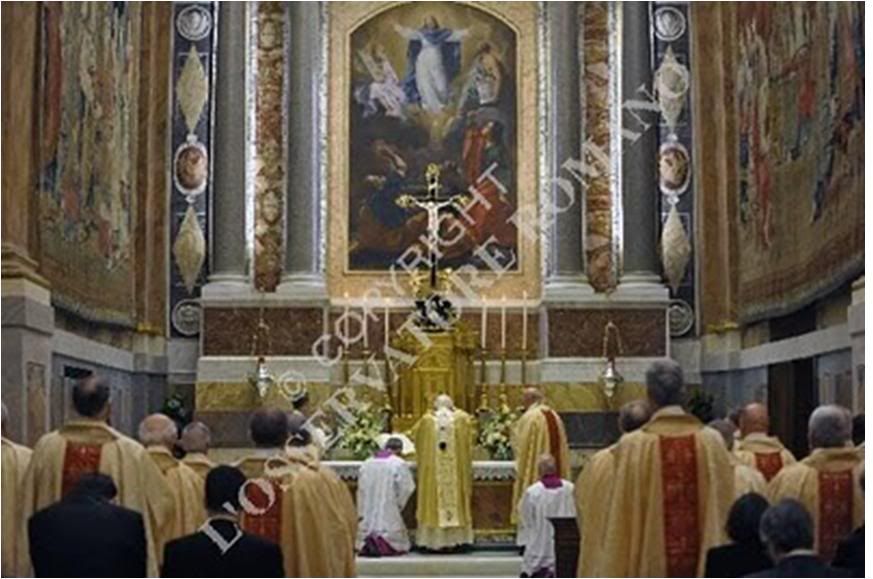
At 7:30 Thursday morning, in the Pauline Chapel of the Apostolic Palace, Pope Benedict XVI celebrated Mass with the members of the Pontifical Biblical Commission.
He delivered a homily in which he spoke of true freedom as rooted in knowledge of and loving obedience to God, as well as the grace of true penitence, the need for pardon, renewal and transformation. We have this report...
The Members of the Pontifical Biblical Commission are holding their Plenary Assembly this week at the Domus Sanctae Marthae.
The meeting opened Monday, and the 5 days of reflection are focusing on the theme of “Inspiration and Truth in the Bible.”
At Mass with the members Thursday morning, Pope Benedict XVI delivered a homily on the relationship of truth and freedom in the context of God’s relationship to human being and human society.
Speaking without a prepared text, the Holy Father said that in modern times we have seen theorized an idea of man according to which human being would be, “free, autonomous, and nothing else.”
This supposed freedom from everything, including freedom from the duty of obedience to God, “is a lie,” said Pope Benedict, a falsehood regarding the basic structure of human being – about the way women and men are made to be, “because,” he continued, “A human being does not exist on its own, nor does it exist for itself.”
The Pope said it is a political and practical falsehood, as well, because cooperation and sharing of freedoms is a necessary part of social life – and if God does not exist – if He is not a point of reference really accessible to THE human being, then only prevailing opinion would remain and become the final arbiter of all things.
Citing the Nazi and Communist regimes of the 20th century as examples, Pope Benedict said such dictatorships could never accept the notion of a God who is above ideological power – and he also stressed that in the present, there are subtle forms of dictatorship auch as radical conformism, which can lead to subtle and not-so subtle aggression toward the Church.
The Holy Father also stressed that for Christians, true obedience to God depends on our truly knowing Him, and he warned against the danger of using “obedience to God” as a pretext for following our own desires.
“We have,” he said, “a certain fear of speaking about eternal life.”
“We talk of things that are useful to the world,” continued Pope Benedict, “we show that Christianity can help make the world a better place, but we do not dare say that the end of the world and the goal of Christianity is eternal life – and that the criteria of life in this world come from the goal – this we dare not say.”
We must rather have the courage, the joy, the great hope that there is eternal life, that eternal life is real life and that from this real life comes the light that illuminates this world as well.
The Pope noted that, when we look at things this way, "Penitence is a grace – even though of late we have sought to avoid this word, too. Now, under the attacks of the world, which speak to us of our sins, we see that to be able to do penance is a grace – and we see how necessary it is to do penance, that is, to recognize what is wrong in our lives: to recognize one’s sin, to open oneself to forgiveness, to prepare for pardon, to allow oneself to be transformed.
"The pain of penance, the pain of purification and transformation – this pain is grace, because it is renewal – it is the work of Divine Mercy".
Pope Benedict concluded his homily with a prayer that our lives might become true life, eternal life, love and truth.
The Plenary Meeting of the Pontifical Biblical Commission is underway through the end of the week.
Apparently, no one in the MSM thought that the Holy Father's decision to start a special catechetical cycle on the priesthood yesterday had anything to do with the 'crisis' they now routinely claim to be 'rocking' the Catholic Church [that's a good one - rocking the ROCK!]. So no one outside of CAtholic news media even reported on it, Yet another case of willful obtuseness or plain obtuseness!
Comes now his homily today to the Pontifical Biblical Commission and everyone chimed in promptly with headlines like the following:
Pope ends silence on sexual abuse
By STACY MEICHTRY

ROME, April 15 — Pope Benedict XVI for the first time addressed the Vatican's handling of the sex-abuse crisis, saying the Church should "do penance" in response to recent public attention to its "sins." [For the first time? The Letter to the Irish was not? It's not even one month since it was issued and they've already consigned it to oblivion???? Read what he says in it about penance by everyone concerned!]
The Pope delivered the remarks in a homily during a Mass in the Pauline Chapel of the papal palace, attended by members of the Vatican's Bible commission.
"We Christians, even lately, have often avoided the word 'penance,'" the Pope said, according to excerpts of the homily posted on Vatican Radio's Web site. "Now, under the eyes of the world that speaks of our sins, we see that doing penance is grace and we see how penance is necessary," he added in an apparent reference to the sex-abuse crisis.
The excerpts of the Pope's homily didn't specifically mention sex abuse by priests. However, the comments' meaning was clear, coming in the wake of hundreds of abuse allegations that have emerged across Europe this year, including in his native Germany.
In mid-March, the Pope issued a letter of apology to Ireland's Catholics over the thousands of documented cases of abuse by priests that damaged the reputation of the Irish Church, a traditional stronghold of European Catholicism.
That letter, however, concerned cases that emerged more than a decade ago. It didn't address the issue of abusive priests in other nations or make reference to the public questions the Pope has faced for his own conduct as the former Archbishop of Munich-Freising.
[Yeah, it should have been a "Letter to the Irish Catholics and oh yes, also to all Catholics in all countries where priests have committed Sexual Abuse"! How can a veteran reporter like Meichtry follow the rest and parrot this ridiculous robotic echo when anyone with common sense can see that there was nothing specific in that letter that could not be applied to the situation everywhere else!
The New York Times reporter in Rome used the homily merely as a springboard to recapitulate the whole series of events and accusations that MSM has been trying saddle onto Benedict's back... But of course, it also means, that another day has passed without a new 'Eureka! Another smoking gun' allegation from the 'mud squads' of MSM.
I gave the MSM too much credit for thinking they would even notice that the Holy Father's catechesis last Wednesday, the first in a special cycle on the priesthood, was one of his continuing responses to the artificial 'crisis' they have generated about the Church. Artificial because they conjured up all their supposed 'smoking guns' - 'smoke and mirrors' rather is what it was - after the Pope's Letter to the Irish Catholics which openly addressed all the genuine problems and concerns about this issue as it had never been done publicly by the Church before! A master coup of indirection by the MSM that made the Letter - for all its historical and substantial impact - even far less than the proverbial seven-day wonder, as far as the MSM was concerned, which would not even accord it 'fifteen minutes of fame'.
Anyway, here is how a Catholic agency CNS eventually reported on the Wednesday catechesis - and even its report came one day after the GA!
Pope says priests called to lead
people out of confusion
By Cindy Wooden

VATICAN CITY, April 15 (CNS)—In a world where many people are confused about right and wrong and even about the meaning of life, priests are called to guide them to Christ, Pope Benedict XVI said.
With just two months left in the Year for Priests, the Pope began a series of audience talks about the priesthood April 14, saying that over the coming weeks he would look specifically at the priest's mission to teach, sanctify and govern.
Speaking on behalf of the groups present at the audience, Vatican officials wished the Pope a happy birthday in French, English, Spanish, Portuguese, German, Polish and Italian. The Pope is to celebrate his 83rd birthday April 16.
Although the international media was still running stories about clerical sex abuse, the Pope did not mention the scandal in his audience talk, but rather spoke about how priests are called to identify so completely with Christ that their words, actions and lives fully represent Christ on earth.
The teaching mission of a priest is especially important today because "we are living amid great confusion about the fundamental choices in life," about the meaning of life and about what is good and what is bad, he said.
Like Jesus who taught the crowds that followed him and gave them direction, the pope said, priests today are called to help people find their way toward goodness, joy and eternal life.
The priest's task is "to make present amid the confusion and disorientation of our age the light of the word of God, the light that is Christ himself," he said.
"The priest does not teach his own ideas" and "he does not speak on his own" or try to gather a circle of admirers around him, but he proclaims the word of God, the Pope said.
At the same time, the Pope said, "he is not a spokesman who simply reads a text that is not his own."
A priest must identify so closely with Christ that the Lord's teaching and values become the priest's own, he said.
In preparing homilies, teaching religious education classes, counseling people "and especially through that unwritten book that is his life, the priest must teach — not with the presumption of one who tries to impose his own truth, but with the humble certainty of one who has encountered the truth, been seized and transformed by it," the Pope said.
My despair is that the Vatican still has no way to communicate the Pope's words directly to the priests of the world other than waiting for them to get online and search the Vatican site for what may be of use to them. Their lives are more than busy enough without expecting them to spare time regularly to look through the welter of information that the Vatican turns out daily - in which the Pope's words are generally not translated promptly enough (and then it takes a lot of navigating to get to the right material because archived material on Benedict XVI's Magisterium is classified into so many different categories (addresses, messages, homilies, letters, motu proprio, etc.... Anyway, I've been through this exercise before, in the PRF, usually after the Holy Father addresses a message directly to priests about the priesthood, as he has done this week, three times in a row...
[Modificato da TERESA BENEDETTA 19/04/2010 01:33] |
| |
 15/04/2010 22:27 15/04/2010 22:27 |
|
| | | OFFLINE | | Post: 19.940
Post: 2.581 | Registrato il: 28/08/2005
Registrato il: 20/01/2009 | Administratore | Utente Veteran | |
|
 Pope to Brazilian bishops:
Pope to Brazilian bishops:
Promote the Eucharist as
'the heart of Christian life'

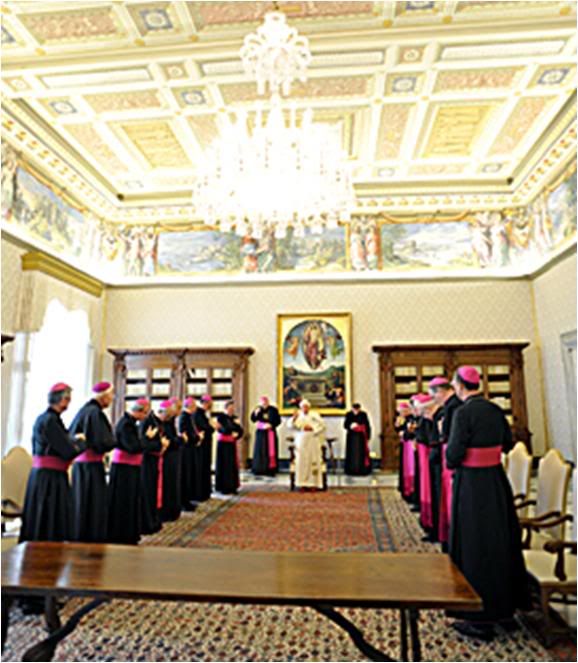
VATICAN CITY, 15 APRIL 2010 (VIS) - Today the Holy Father received the prelates of the North II Region of the Brazilian National Conference of Bishops on the conclusion of their ad limina visit.
Speaking of the Eucharist, the Pope recalled that it constitutes "the centre and permanent source of the Petrine ministry, the heart of the Christian life, source and summit of the Church's mission of evangelization. You can thus understand the concern of the Successor of Peter for all that can obfuscate this most essential point of the Catholic faith: that today, Jesus Christ continues alive and truly present in the consecrated host and the chalice."
"Paying less attention at times to the rite of the Most Holy Sacrament constitutes," he said, "a sign and a cause of the darkening of the Christian sense of mystery, such as when Jesus is not the centre of the Mass, but rather a community preoccupied with other things instead of being taken up and drawn to the only one necessary: their Lord."
Benedict XVI emphasized that "if the figure of Christ does not emerge from the liturgy ... it is not a Christian liturgy". This is why, he added, "we find those who, in the name of inculturation, fall into syncretism, introducing rites taken from other religions or cultural particularities into the celebration of the Mass."
As Venerable John Paul II wrote, "the mystery of the Eucharist is 'too great a gift' to admit of ambiguities or reductions, above all when, 'stripped of its sacrificial meaning, it is celebrated as if it were simply a fraternal banquet'."
The Pope highlighted that "behind many alleged motives, there exists a mentality that is incapable of accepting the real possibility of divine intervention in this world to assist human beings. ... Admitting God's redeeming intervention to change our situation of alienation and sin is seen as fundamentalism by those who share a deist vision and the same can be said about the sacramental sign that makes the salvific sacrifice present. For such persons, the celebration of a sign that corresponds to a vague sentiment of community would be more acceptable."
"Worship, however," he continued, "cannot come from our imagination: that would be a cry in the darkness or mere self-affirmation. True liturgy supposes that God responds and shows us how we can adore Him. ... The Church lives in His presence and its reason for being and existing is to expand His presence in the world."
The Holy Father concluded, recalling that within a month the 16th National Eucharistic Congress will be celebrated in Brazil. In this context he asked that Jesus in the Eucharist "truly be the heart of Brazil, from which comes the strength for all Brazilian men and women to recognize themselves and help one another as brothers and sisters and as members of Christ. Whoever wishes to live, has a place to live, has something to live for. Let them draw near, create and begin to form part of the Body of Christ and they will be given life."

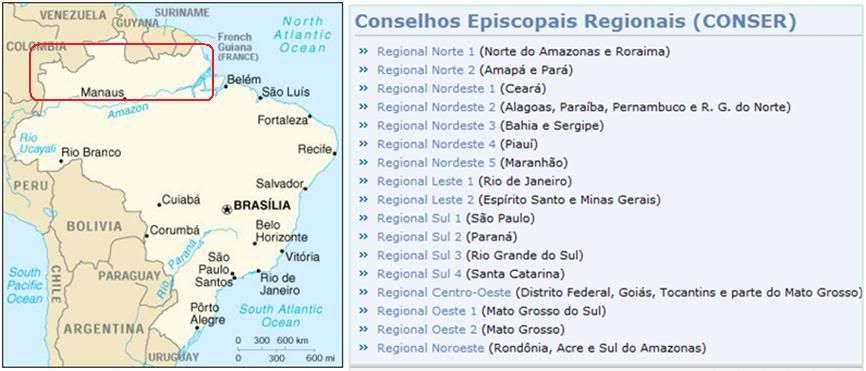 The group of Brazilian bishops seen today by the Pope represent the dioceses north of the Amazon River.
The group of Brazilian bishops seen today by the Pope represent the dioceses north of the Amazon River.

Coincidentally, or better yet, consistent with the above, although the timing is entirely fortuitous, Ignatius Press is coming out with this book about the Holy Father and the liturgy of the Eucharistic Sacrifice:
 The blurb from
The blurb from

The celebration of the Eucharist, in which Jesus Christ becomes present, is the center of the Catholic faith. This volume brings together substantive texts of the Holy Father on the many aspects and dimensions of the Mass and the Mystery of the Eucharist, a rich source for every Christian and a spur to reflection and personal prayer.
Delivered in addresses and homilies to a wide variety of audiences , these reflections reveal the depth and breadth of Pope Benedict XVI’s profound and life-long love for the Holy Eucharist.
A major theme throughout the works of Joseph Ratzinger, the Real Presence of Jesus in the Eucharist is the Church’s source of life, unity and fruitfulness. This theme has been carried deeply into his pontificate, as can be seen in this collection, which challenges the faithful to believe that by receiving Christ in Holy Communion, they are drawn not only into the very life of God, but into the community that is Christ’s Body, the Church.
“In the institution of the Eucharist we see the very foundational act of the Church. Through the Eucharist the Lord not only gives himself to his own, but gives the reality of a new community ‘until he comes’ (cf. 1 Cor 11:26). Through the Eucharist the disciples become his living house that grows through history as the living Temple of God in this world.”
— Pope Benedict XVI
"Ignatius Press has done a remarkable service by drawing these talks and homilies by Benedict XVI into one rewarding volume on the importance of the Eucharist. Clear, deep, rich and engaging: All of these qualities mark the style of the Holy Father as a teacher, and anyone reading this book will discover the joy of Christian life and the beauty of Catholic worship in a new way. I highly recommend it."
- Charles J. Chaput, O.F.M. Cap., Archbishop of Denver
"The Eucharistic sacrifice makes sacramentally available Christ’s love for his Father and for us. These reflections by our Holy Father make available for our spiritual formation the truths that shape our life in Christ’s body, the Church. They bring again to our attention the wisdom born of love."
— Francis Cardinal George, OMI, Archbishop of Chicago
“In these collected talks we find, one might say, the quintessential Benedict. Those who have read his Jesus of Nazareth, The Spirit of the Liturgy, or other of his works, will recognize here that amazing concord which he always achieves by bringing effortlessly together sound biblical scholarship (he ranges easily over Law, prophets, Gospels, and Epistles), deep love for the Eucharist, and an unflagging pastoral tone which addresses us laity in language that we can grasp. The selections are brief, hence the volume offers readers very accessible "devotional" reading."
— Thomas Howard, Author, 'If Your Mind Wanders at Mass'
[Modificato da TERESA BENEDETTA 15/04/2010 22:47] |
| |
 16/04/2010 11:04 16/04/2010 11:04 |
|
| | | OFFLINE | | Post: 19.943
Post: 2.584 | Registrato il: 28/08/2005
Registrato il: 20/01/2009 | Administratore | Utente Veteran | |
|

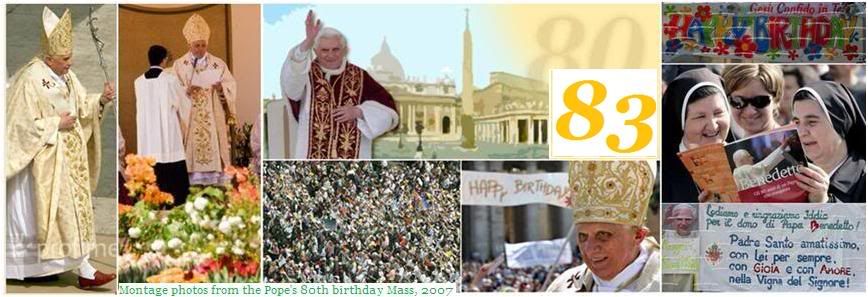
ALL OUR LOVE AND PRAYERS
FOR OUR BELOVED HOLY FATHER,
ROCK OF THE CHURCH,
ON HIS 83RD BIRTHDAY.
AD MULTOS ANNOS, SANCTE PATER!


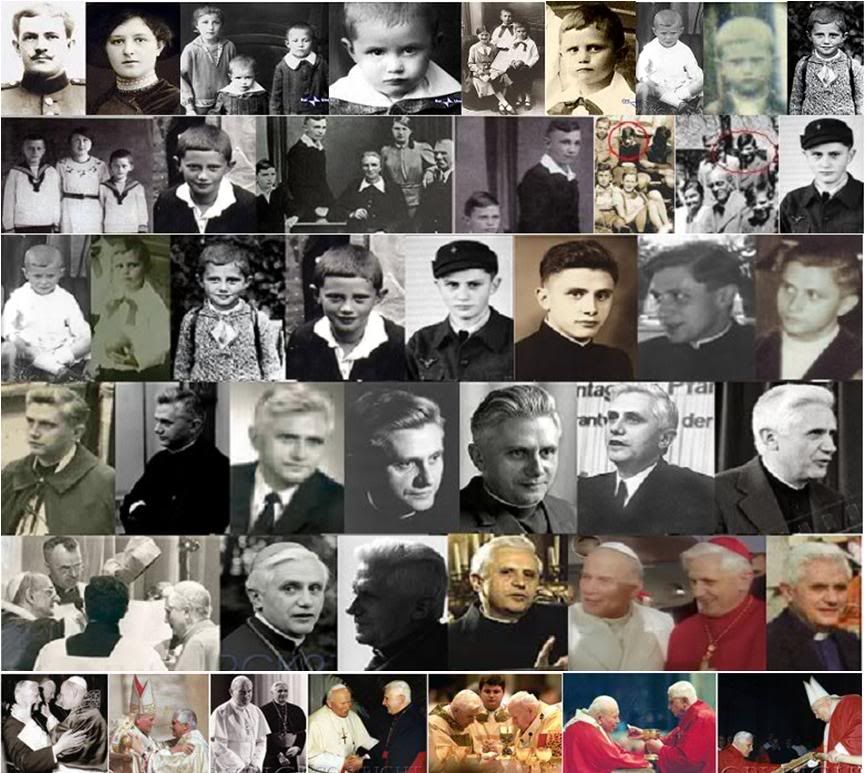





 I did not have time to prepare anything new, so I put together a few strips I mounted about two years ago -
I did not have time to prepare anything new, so I put together a few strips I mounted about two years ago -
there is some duplication of photos because I did the 'early Ratzinger' strips on two separate occasions.
Friday, April 16
 ST. MARIE BERNARDE (BERNADETTE) SOUBIROUS (France, 1844-1879), Visionary and Virgin
ST. MARIE BERNARDE (BERNADETTE) SOUBIROUS (France, 1844-1879), Visionary and Virgin
One of the most popular of modern saints, Bernadette was a virtuous and sickly peasant girl of 14 who had not even made her first Communion when 'a lady appeared to her on February 11, 1848, in a rocky grotto beside the river Gave in the Pyrenean village of Lourdes. She saw her 17 times more. The Lady identified herself on one of the earlier apparitions, 'I am the Immaculate Conception', a term which meant nothing to the unlettered girl. [Pope Pius IX would not declare the dogma of the Immaculate Conception until 1858). The Marian apparitions at Lourdes attracted worldwide attention. After initial skepticism, the Church gave credence to her story, and she soon was hounded for her fame. She entered a convent in Nevers where she worked humbly despite her chronic sickliness and professed her vows before she died at age 35. Meanwhile, Lourdes had grown into the most visited shrine on earth. Bernadette was canonized in 1935. When her body was exhumed before her beatification, it was found to be incorrupt and is venerated at the convent in Nevers .
Readings for today's Mass: www.usccb.org/nab/readings/041610.shtml
OR today.
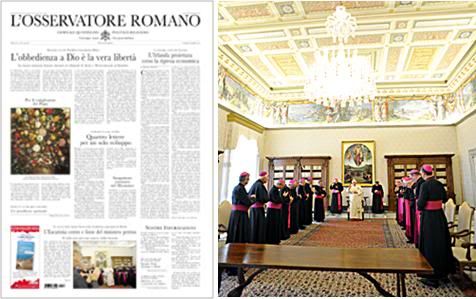
Benedict XVI to the Pontifical Biblical Commission:
'The Eucharist is the center and source of the Petrine ministry'
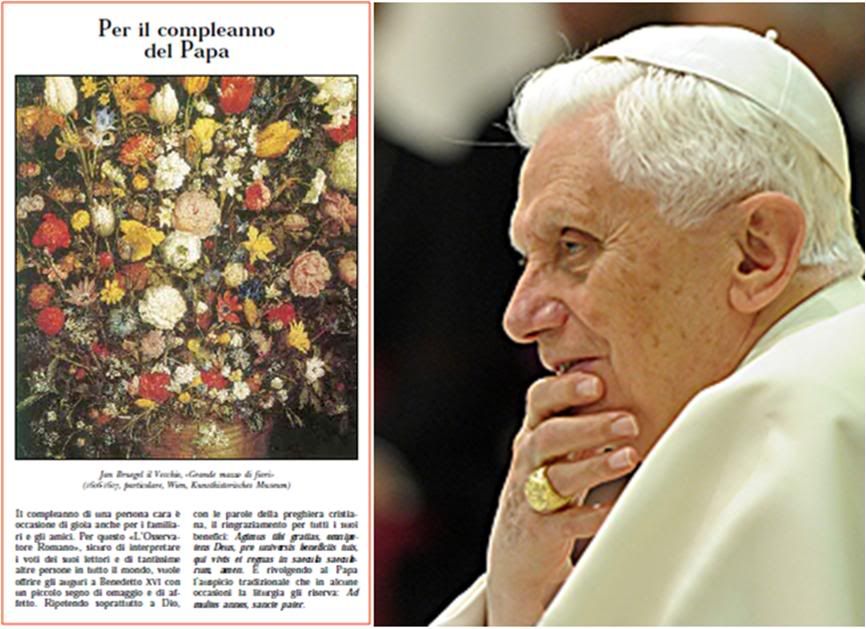 Illustration: Detail from Jan Breughel the Elder's Great Mass of Flowers, Vienna, Kuensthistorisches Museum.
The OR greets the Holy Father on his birthday; and the Holy Father urges the bishops of Brazil to promote the Mass as the center of Christian life. In the inside pages, an essay by Mons. Robert Zollitsch, president of the German bishops' conference on Benedict XVI's spiritual Pontificate'. Page 1 international stories: an article by Ireland's foreign minister on his country's path to economic recovery; the BRIC nations - Brazil, Russia, India and China - are poised to press the World Bank and the International Monetary Fund for more equitable world financial regulations (they represent 26% of the world's territory, 42% of its population and 15% of gross production); and three unattributed bomb explosions kill 26 in Yangon as Myanmar celebrates the Buddhist New Year.
THE POPE'S DAY
Illustration: Detail from Jan Breughel the Elder's Great Mass of Flowers, Vienna, Kuensthistorisches Museum.
The OR greets the Holy Father on his birthday; and the Holy Father urges the bishops of Brazil to promote the Mass as the center of Christian life. In the inside pages, an essay by Mons. Robert Zollitsch, president of the German bishops' conference on Benedict XVI's spiritual Pontificate'. Page 1 international stories: an article by Ireland's foreign minister on his country's path to economic recovery; the BRIC nations - Brazil, Russia, India and China - are poised to press the World Bank and the International Monetary Fund for more equitable world financial regulations (they represent 26% of the world's territory, 42% of its population and 15% of gross production); and three unattributed bomb explosions kill 26 in Yangon as Myanmar celebrates the Buddhist New Year.
THE POPE'S DAY
The Holy Father met today with
- Cardinal Giovanni Battista Re, Prefect of the Congregation for Bishops (weekly meeting)
- Bishops of Brazil (Group 3, North Sector II) on ad limina visit
- Members of the Papal Foundation.
The Holy Father has named Cardinal Angelo Sodano, Dean of the College of Cardinals, to represent him
at the funeral services for President Lev Kaczynski and his wife, who died in an airplane crash this week.
The Vatican has released the official program for the Holy Father's apostolic visit to Turin on May 2,
where he will venerate the Holy Shroud now on public exposition.
The Pope undertakes his first trip abroad this year tomorrow, to visit Malta from Apirl 17-18.
 Sign at last Wednesday's GA reads: 'PAPA - you are the Blessed One!'
PLEASE REMEMBER -
Sign at last Wednesday's GA reads: 'PAPA - you are the Blessed One!'
PLEASE REMEMBER -
WE MUST FLOOD OUR DEAREST PAPINO
WITH OUR BEST WISHES FOR HIS BIRTHDAY
AND HIS FIRST 'LUSTRUM' AS POPE:
mailto:benedictxvi@vatican.va
[Modificato da TERESA BENEDETTA 16/04/2010 14:51] |
| |
 16/04/2010 13:04 16/04/2010 13:04 |
|
| | | OFFLINE | | Post: 19.944
Post: 2.585 | Registrato il: 28/08/2005
Registrato il: 20/01/2009 | Administratore | Utente Veteran | |
|
 Probably few in MSM will so much as a give a thought to the Holy Father's 83rd birthday today, much less wish him well... It's the prerogative, of course, of detractors, to find nothing good to say about their target, But the relentless vituperation of the Pope's most vocal critics these days is as disgusting as the worst of Julius Streicher's anti-Jewish rants during the Third Reich. But of course, liberals in general never ever see the planks that board up not just their eyes, but also the windows of their soul. Fr. Di Souza takes on one who is probably the most vicious neo-Streicher of all - even as, in the process, he gives his readers a primer on how the Church has dealt with sex-offender priests over the past 10 years, at least in the US and Canada!
A critic blinded by hatred
Probably few in MSM will so much as a give a thought to the Holy Father's 83rd birthday today, much less wish him well... It's the prerogative, of course, of detractors, to find nothing good to say about their target, But the relentless vituperation of the Pope's most vocal critics these days is as disgusting as the worst of Julius Streicher's anti-Jewish rants during the Third Reich. But of course, liberals in general never ever see the planks that board up not just their eyes, but also the windows of their soul. Fr. Di Souza takes on one who is probably the most vicious neo-Streicher of all - even as, in the process, he gives his readers a primer on how the Church has dealt with sex-offender priests over the past 10 years, at least in the US and Canada!
A critic blinded by hatred
Father Raymond J. de Souza

April 15, 2001
Do you remember the carnival game Whack-A-Mole? Up pops one mechanical mole from his hole, you whack it down and up pops another. There is no pleasure to be taken in revisiting the sordid mess of sexual abuse, but the regular appearance of Christopher Hitchens in these pages requires it. Moles are naturally blind. Hitchens is blinded by hatred.
A few weeks back Hitchens appeared here, vomiting forth his bilious anti-Catholic defamation. Having convinced himself that God is a fraud, he merrily concludes that by definition all religious believers are fools or knaves, and thus attributes to them all manner of evil.
He hated Mother Teresa. Not from a distance, mind you, but signed up to provide offcolour commentary on her funeral Mass, all the better to denounce her between the altar and the grave. It was, not for the last time, a disgusting performance.
No surprise then that, in full frothing fulmination, he slandered Pope Benedict XVI for "obstructing justice on a global scale." My colleague Rex Murphy then shovelled out the Hitchens stall, but so prodigious is the excrement that there remains work to be done. It is not fair to make Rex, only having recently joined us here, do the dirty work every week.
On Tuesday, Hitchens, waging his atheistic holy war against Benedict, wrote that then-Cardinal Ratzinger's signature had been found on a -- get ready for it -- "permission to rape." Not daunted by previously relying upon a Wisconsin case reported in The New York Times and discredited in these pages, Hitchens now thinks he has found a smoking letter in a case from Oakland regarding Stephen Kiesle.
If only the Oakland diocese had handed over the priest to the criminal justice system rather than petitioning Rome in 1981, Hitchens wrote, decades of subsequent abuse could have been avoided. Up pops the mole: Here we have it, Ratzinger is told about an abuser, and he makes sure that no one tells the police! Kiesle continues to work with children on direct orders of Rome! Ratzinger issues the Vatican-embossed "permission to rape"!
Whack! In 1978, the priest was arrested, convicted and sentenced by the California courts. From that moment, he was never again allowed to exercise any priestly ministry. In 1981, already barred from any priestly work, Kiesle asked to be formally dismissed from the priestly state. Such requests presume that all ministry has already ceased. The dismissal came in 1987. Ratzinger's only involvement was to write in 1985 that because the case was very grave, it required careful scrutiny. After Kiesle was dismissed, he abused another minor in 1995 as a married man, for which he was convicted.
For someone who hates the Catholic Church as much as Hitchens does, it should be sufficient just to tell the truth about the wicked things done and the necessary reforms that were too long in coming. He could consult a number of reports on the matter, some of them commissioned by the Church, others by law enforcement, still others by government inquiries.
It is not really that hard to understand how the shape of this is different today than in 1975. Can it be that Hitchens and his ilk, riveted by this issue for years, still don't know the basics of Church law on priestly discipline?
An ordained priest has "clerical" status in Church law, accompanied by certain rights and responsibilities. He also needs permission from his own bishop to exercise his ministry -- to present himself as a priest, to preach, to offer Mass, to hear confessions, to be the pastor of a parish, etc.
His functioning as a priest is of greatest practical impact. The bishop can refuse or remove permission to exercise any public ministry. He can forbid a priest to live in the parish rectory. He can force a priest to live privately, reduced to saying Mass alone at his kitchen table.
In fact, that is now routine in Canada (and the United States) in matters of sexual abuse. When a credible accusation is received, before the investigation begins, the priest is "removed from ministry." He can be out of his parish within the day.
When an investigation concludes the abuse took place (at a much lower threshold that the "reasonable doubt" standard in criminal law) the priest is permanently suspended from all ministry -- making permanent his situation during the investigation.
At that point, proceedings can begin for a "dismissal from the clerical state" or "laicization," which strips the priest of his priestly status in the Church, the so-called "defrocking."
But in terms of child safety and priestly functioning, the removal from ministry occurs at the first step, before guilt is even established or more serious penalties are even considered. It's a key point to remember as the moles crawl around searching for decades-old memoranda.
One can think it of it as analogous to bail. An accused is granted bail so that he can go about his regular business, presumed to be innocent, until a trial determines otherwise. In some cases, bail is denied, and the suspect is remanded into custody.
With allegations of sexual misconduct against priests, there is no bail--no going about one's regular business until innocence or guilt is determined. Immediate removal from ministry means being off the job and out of office, home and parish immediately. That's a higher standard.
Was this higher standard always met? No, and the failure to act forcefully and expeditiously according to Church law is at the heart of the sexual abuse story.
Before the necessity of responding to the false allegations about Cardinal Ratzinger came to dominate my time, I wrote two columns in March on the necessary culture change required in the Church.
That culture change has been underway for some time, both in Rome and in North America. Bishops in other countries need to follow. The Archdiocese of Toronto has the toughest reporting requirements of any institution in Canada about allegations of sexual abuse of minors -- one hour. Reforms have been real and in place for some time. Real reform was needed because there was a real problem.
It is a peculiar act of wilful blindness to ignore the current rules, practices and protocols, in place for 10 or 15 years, in order to search exclusively for imagined malfeasance from 30 years ago.
Quoting the Bible to Hitchens is like giving garlic to a vampire, but the prophet Jeremiah may have played a little Whack-A-Mole in his day, for he laments the "foolish ones, without understanding, who have eyes and see not."
John Allen was on top of a late statement yesterday from the Vatican Press Office posted today on the Vaticcan website:
Vatican decries 2001 letter
from Cardinal Castrillon that
condoned not reporting
priest offender to the police

April 15, 2010
Late this evening Rome time, the Vatican released a statement in response to media reports in France about a September 2001 letter from Colombian Cardinal Dario Castrillón Hoyos, at the time the prefect of the Vatican's Congregation for Clergy, congratulating a French bishop for not reporting an abuser priest to the police.
In effect, the Vatican statement suggests that Castrillón Hoyos was part of the problem which then-Cardinal Joseph Ratzinger, now Pope Benedict XVI, eventually solved.
The letter, first published by the French Catholic publication Golias, is addressed to Bishop Pierre Pican of Bayeux-Lisieux, France, who was eventually sentenced to three months in prison for refusing to report a French priest, Fr. René Bissey, convicted in October 2000 for sexual abuse of eleven minor boys between 1989 and 1996.
Castrillón Hoyos’s letter congratulates Pican for not repoting Bissey to the French police and civil authorities. In the version published by Golias, it reads: “I rejoice to have a colleague in the episcopate who, in the eyes of history and all the others bishops of the world, preferred prison rather than denouncing one of his sons, a priest.”
[On the other hand, one might see the bishop's willingness to serve time for his non-reporting as his way of doing penance for a decision in which he let his own paternal duty as a bishop - not to mention the culture in the Church till then regarding sex offenses by priests - override his civic duty to report a crime. It's a rather intriguing story that deserves more than superficial attention.]
Tonight’s Vatican statement suggests that Castrillón Hoyos’s attitude was part of the reason that then-Cardinal Joseph Ratzinger, now Pope Benedict XVI, pressed for a more aggressive policy on the removal of predator priests.
“This document is another confirmation of how timely was the unification of the treatment of cases of sexual abuse of minors on the part of members of the clergy under the competence of the Congregation for the Doctrine of the Faith,” said the statement released by the Vatican press office.
The Vatican statement said that move assured “a rigorous and coherent management [of the cases], as in fact happened with the documents approved by the pope [John Paul II] in 2001.”
Pope John Paul II approved a motu proprio, meaning an amendment to church law [at the sole volition of the Holy Father], that gave the Congregation for the Doctrine of the Faith under then-Cardinal Joseph Ratzinger responsibility for handling the sexual abuse crisis in May 2001.
In a "layman's guide" to Church procedures published earlier this week, the Vatican insisted that bishops are to cooperate with legal requirements about reporting allegations of abuse to the civil authorities. [BTW, Italian Vaticanistas have poined out that those guidelines have been in force at the CDF since the implementation of the Motu Proprio, just never before published, not even in 'legalese'.]
Vatican analysts have long regarded Castrillon Hoyos as part of the “old guard” opposed to the reforms on sex abuse cases instituted by Ratzinger. In 2002, for example, Castrillón Hoyos led a Vatican press conference after the sexual abuse crisis erupted in the United States in which he suggested the crisis was largely an “American problem.”
It was also Castrillón Hoyos who was informally assigned the blame when Pope Benedict XVI lifted the excommunications of four traditionalist bishops, including one who is a Holocaust-denier, in 2009. That decision was prepared by a Vatican commission led at the time by Castrillón Hoyos. [This is irrelevant! Castrillon's role in the FSSPX case has nothing to do with his personal attitude towards the reporting of sexual abuse.]
Castrillón Hoyos stepped down as prefect of the Congregation for Clergy in 2006, and as head of the 'Ecclesia Dei' Commission, dealing with traditionalist Catholics attached to the Latin Mass, in 2009. [We might surmise that the cardinal's attitude about priest offenders may have been a factor that led Benedict XVI to replace him at Clergy with Cardinal Hummes who had an activist reputation.]
Tonight’s statement is a milestone from the Vatican. Rather than defending Castrillón Hoyos’s September 2001 letter, the statement essentially concedes that it’s an embarrassment, but insists that subsequent action by the Congregation for the Doctrine of the Faith under Ratzinger amounted to a repudiation of the attitude it implied.
In effect, this is the first time the Vatican has conceced that a senior Vatican official committed an error in judgment on the sexual abuse crisis -- albeit one later corrected by the future Pope.
[Modificato da TERESA BENEDETTA 16/04/2010 14:33] |
| |
 16/04/2010 15:37 16/04/2010 15:37 |
|
| | | OFFLINE | Post: 238
Post: 4 | Registrato il: 21/10/2008
Registrato il: 03/09/2009 | Utente Comunità | Utente Junior | |
|
Hi Teresa
Concerning Mgr Pican, I remember he was sentenced to three months (suspended sentence) and Bissey to 18 years. The issue was mainly that Pican covered up and moved him from one parish to another without informing the parishes and all this after having been repeatedly informed by the families.
We had no such scandal since then but this case was discussed by the bishops in 2000. Here is the link.
www.la-croix.com/Les-eveques-de-France-face-a-la-pedophilie/article/2418...
Cardinal Vingt-Trois said recently there is actually about 30 priests in jail out of 20000 for sex affairs.
 Thanks for the info, Flo! The important thing is that the offender priest was convicted - with quite a long sentence, too!... It seems that there;s a good record of punishing abbusive priests in France, but the media are not interested, perhaps because good news is no news to them. By their definition, news is what they can make to look like a scandal in the Church and especially, for the Pope!
Thanks for the info, Flo! The important thing is that the offender priest was convicted - with quite a long sentence, too!... It seems that there;s a good record of punishing abbusive priests in France, but the media are not interested, perhaps because good news is no news to them. By their definition, news is what they can make to look like a scandal in the Church and especially, for the Pope!
TERESA
[Modificato da TERESA BENEDETTA 17/04/2010 00:34] |
| |
 16/04/2010 17:25 16/04/2010 17:25 |
|
| | | OFFLINE | | Post: 19.945
Post: 2.586 | Registrato il: 28/08/2005
Registrato il: 20/01/2009 | Administratore | Utente Veteran | |
|
 For the first time in at least three years, I failed to post a reflection by Father Schall as soon as I saw it (my atention must have snagged on something else in the course of reviewing my Forum priorities). This one is four days old, but of course, Fr. Schall has the gift of timelessness that characterizes the deep thinkers...
For the first time in at least three years, I failed to post a reflection by Father Schall as soon as I saw it (my atention must have snagged on something else in the course of reviewing my Forum priorities). This one is four days old, but of course, Fr. Schall has the gift of timelessness that characterizes the deep thinkers...


April 12, 2010
"Do not be surprised, beloved, that a trial by fire is occurring in your midst. .... See to it that none of you suffers for being a murderer, a thief, a malefactor, or a destroyer of another's rights. If anyone suffers for being a Christian, however, he ought not to be ashamed. He should rather glorify God in virtue of that name. The season of judgment has begun, and begun with God's own household. If it begins this way with us, what must be the end for those who refuse obedience to the gospel of God?"
-- 1 Peter, 4: 12-17.
"Jesus...is 'full of grace and truth' (Jn. 1:14): he can read every human heart, he wants to condemn the sin but save the sinner, and unmask hypocrisy. St. John the Evangelist highlights one detail while his accusers are insistently interrogating him, Jesus bends down and starts writing with his finger on the ground. Thus, Jesus is the Legislator, he is Justice in person. And what is his sentence? 'Let him who is without sin among you be the first to throw a stone at her.' These words are full of disarming power of truth that pulls down the wall of hypocrisy and opens consciences to a greater justice, that of love, in which consists the fulfillment of every precept."
-- Benedict XVI, Angelus, March 20, 2010 (ORE, March 24)
I.
Let me see if I can spell out reasons for the latest publicity about clerical abuse, particularly what it has to do with the Church's legitimacy. Some think we have here an issue that can finally carry out Voltaire's famous exclamation about the Church: "Crush the Infamous Thing." ['Ecrasez l'Infame!']
Of course, behind Voltaire was the counter position of the Lord's own guarantee that the same Church teachings would last even to the consummation of the world.
This assurance, however, did not mean that no Catholic, no priest, would ever sin again. Nietzsche was rather scandalized that Christians did not live exactly as Christ did. But they did come to live as Christ actually expected, lives often in need of forgiveness.
It is, in this sense, difficult to fault the Church for finding in its ranks those whom Christ also expected to find there. This situation was, after all, a main reason why He came in the first place, that we repent and have our sins forgiven, not repeated ad infinitum.
We are seeing repeated on an international scale what we first saw on a national scale. We see cases in Norway, Chile, Germany, and Ireland. No doubt, as it says in Scripture, everything will be shouted from the housetops until we become completely bored with it all. It is a growth industry. The history of the Church (and mankind) in every century sees similar things recurring.
In principle, it is a good thing that we know the extent and destructive nature of these disorders, to the individuals concerned, both victims and perpetrators, as well as to the public and to the Church. Christ died to save sinners from their own free choices. He evidently did not come to prevent the possibility of sinning. Had he done this latter, He would have come to make men cease to be men.
If Benedict XVI has brought anything to the fore in Catholic theology, it is the nature and necessity of "judgment" of the acts we put into the world. This judgment is what Spe Salvi, among other things, is about. It is also very much what Plato is about.
Augustine had said that Christian revelation was not necessary to learn what virtue was. The pagan philosophers understood this already. What mystified the great pagan thinkers was not the definition of virtue but its practice.
What we quickly learned both during and after the life of Christ was that the practice of virtue, even with grace, would still be quite difficult. Christians, along with everyone else, would still too often be sinners.
One does not become a Christian in order to guarantee that he will never sin again. He becomes a Christian in order, should he sin again, that he need not despair of his soul's eternal fate, provided he is willing to respond as Christ in the Church asked him.
Thus, Christianity was also about repentance and forgiveness, without ceasing to be about judgment. But this possibility of repentance did not erase the harm our sins cause to others or the penalties of law designed to promote a decent order.
Aquinas said that the civil law does not cover every sin but only the most serious ones, those without which people cannot live together. Certainly, the possibility of changing one's life after great faults is central to our understanding of human nature and freedom.
But so is the experience of those who refuse, when given a chance, to re-establish proper order in their own lives. Like alcoholics, some people keep doing the same things over and over. The external effects of their internal disorders also need to be attended to.
II.
As William Donohue often points out, this issue, as presented in the media, is never about the same crimes that are widely committed by members of other institutions, by public school teachers, protestant or other clergy, by people in business, military, unions, or other public bodies. Many suits are pending in all these categories, but we seldom see anything about them in the media. Why?
Most studies show that abuse that unhappily arises in some few Catholic clergy is about the same as other categories of society, granted that we would like it not exist at all. Such factors alone make one suspicious about the real motivation behind materials that we now read every day from all over the world.
Even if we are concerned about child abuse, as we must be, is this the concern what we are seeing spelled out? Does the interest in child abuse just happen to be the one issue that allows the Church to be isolated?
Few can doubt that leaders in the Church were slow to deal with these areas, or even how to deal with it. They say so themselves. Many other groups have only begun to face these issues but they do not seem to get the media attention that the same issue among Catholics receives. The slowness of Catholic leaders was, in part, also due to the culture that has fostered a lack of respect for life and virtue.
Widespread areas of moral disorder go on every day with little concern at all. I saw recently, for instance, that in 2008, on the continent of Europe, we had 2,635,919 abortions. That is more than the whole population of many countries and states. Such numbers, however, hardly cause a ripple of moral concern even when the very population of many nations is rapidly declining.
Many, it now appears, seem to think that they finally have the slippery Church on the run. What the sins of the clergy are is no longer the main issue. Indeed, it is a dangerous issue for the accusers as it borders rather too closely on cherished "rights." It is not an accident that the relation of abuse and homosexuality is rarely honestly treated in this consideration.
The issue of concern is both legal and doctrinal. The law has now managed to make not the person who commits the crime guilty but those "responsible" for him. This move allows large sums of monies to be transferred from the Church to the lawyers and those who have sensible damages. Cherished protections like the statutes of limitation were changed specifically to allow this present situation to play itself out. It is doubtful if the principle that one is innocent until proved guilty any longer holds much force in this area. Many innocent persons, no doubt, have been unjustly treated in this atmosphere.
There are lawyers on International Criminal Courts who want to "try" Benedict himself for "humanitarian" crimes. They love this sort of absorption of all law into their hands. Some protesters in England want to prevent Benedict's upcoming visit on the grounds that he was somehow negligent. No one doubts that holding political and ecclesiastical officials to strict standards of justice is a good idea. Absolutely no one can have any problem with this if it is done reasonably.
III.
In the beginning of these considerations, I cited a reflection of Benedict about the Gospel story of the woman caught in adultery. Evidently, she is guilty, whatever we now think of adultery and the punishment of it in the Old Law. Adultery is often considered more of a recreation than a moral problem. We are all against capital punishment for any crime or any sort.
But Benedict notes the hypocrisy involved in this scene. The woman had recognized the problem. The local leaders wanted to stone her. Christ did not concern himself with the prescriptions of the Old Law or whether the woman was guilty. He concentrated on the accusers. What were their souls really like? He knew. He wrote on the ground. They knew He knew.
Evidently, each accuser suddenly realized that he was in a worse position than the woman. On this self-reflection, each walks away silently, hopefully wiser. No one is left to accuse her. Does that mean that she was not guilty? No. Does it mean that we need to be pretty careful how we judge others? Yes, it does.
We look at our modern day accusers. We look at what they hold. They have few if any problems with all sorts of human disorders which they have now made to be "human rights." The one classical thing that they still hold is that child abuse is wrong. But it is mainly wrong because no "consent" is involved.
The same activities of those "of age" are deemed acceptable. Consent makes all sorts of sordid things all right. But does that make them all right?
This issue is the center of the crisis of our civilization. Much of the publicity about child abuse is really, I think, about the Church's stance on what is objectively wrong. This issue is the one place that the secular society and the Church agree. The Church has never taught these things are all right, even when done by presumably pious men. Thus, the implication that the Church is not a valid upholder of moral law because of this issue must be rejected.
But what is behind it all? What is sought is the de-legitimization of the Church because it continues to point to the disorders in our moral life that are now made over into civil law and enforced by it. The state wants its definition to be "holy." The only major impediment remaining to this absolute goal is the Church, which includes sinners.
The implication of the accusers of Church officials is that their own acts or their dealings with abusers are at times objectively wrong. Often they are. The Church has no problem in admitting these facts, when they are facts.
The second citation I cited was from the first letter of Peter. It is quite instructive. Peter is not surprised that there may well be murderers, thieves, and other sorts among the believers. If so, the instruction is simple: "Stop." It assumes this stopping is possible. We are free.
Then the epistle adds that, if the real opposition arises because we are Christian, then we should rejoice. The same thing happened to the Lord. He was hated not because of bad things but because of good ones. So what is at work here may not be only a question of sinful Christians and their inept responses. It may rather be about whether there is still in the world an authority that stands over against its living disorders.
People of the household of God are warned about the judgment of their acts and holdings. Likewise are those judged who "refuse the Gospel of God." Sometimes when I read about those who accuse the Church in this area, I wonder what would happen if they were selected to throw the first stone.
The final judgment of these things is necessary if the world is to be complete. What many want is the removal of any thought of such a judgment if it does not agree with their self-made world. In this sense, I think, we witness not so much a wringing of hands about sinful clerics, but an attack on the last force that can credibly state the disorders of our own souls and public lives.
|
| |
 16/04/2010 21:12 16/04/2010 21:12 |
|
| | | OFFLINE | | Post: 19.946
Post: 2.587 | Registrato il: 28/08/2005
Registrato il: 20/01/2009 | Administratore | Utente Veteran | |
|
 Among the 'embarrassment of riches' one has to choose from these days in terms of personal tributes to the Holy Father, I have chosen to translate first excerpts from a new interview book with the Archbishop of Paris, Cardinal Andre Vingt-Trois, that Beatrice has very kindly shared on her site.
Among the 'embarrassment of riches' one has to choose from these days in terms of personal tributes to the Holy Father, I have chosen to translate first excerpts from a new interview book with the Archbishop of Paris, Cardinal Andre Vingt-Trois, that Beatrice has very kindly shared on her site.
I gave given it translation priority over a birthday letter to the Holy Father written by Cardinal Joachim Meisner for today's issue of BILD, because Cardinal Vingt Trois is not and never was considered a 'Ratzingerian' as Cardinal Meisner, who also has a deep and long-lasting personal friendship with Joseph Ratzinger.
But I must also point out that Cardinal Vingt Trois was one of the very first cardinals, in the Roman Curia or out of it, who spoke out promptly for Benedict XVI when the current media-rigged outcry first began, and that even in the matter of Summorum Pontificum which most French bishops oppose, he eventually indicated his 'communion with the Successor of Peter'...
Below is my translation of Beatrice's intro and the excerpt she shares with us:
Cardinal Vingt-Trois speaks about
Benedict XVI in a new book

Under the title Une mission de liberte, Cardinal Vingt Trois has just published through Denoel [publishing house] an interview book with an 'atheist' journalist, Pierre Jouve....
This is not the place to discuss Cardinal Vingt-Trois, so I will limit myself to his responses about his relations with Benedict XVI.
The cardinal is not a 'mediatic' man, he is an introvert, he is not expansive, he does not seek to 'seduce' his listener, which is in his favor....
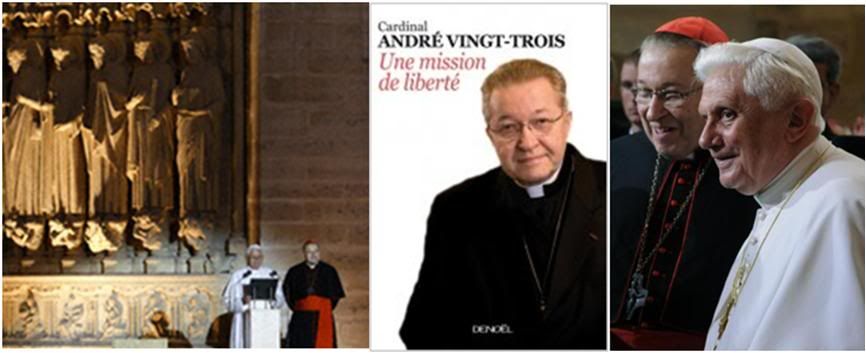 Right photo: Benedict XVi and Cardinal Vingt-Trois outside Notre Dame Cathedral at an encounter with French youth in September 2008.
Right photo: Benedict XVi and Cardinal Vingt-Trois outside Notre Dame Cathedral at an encounter with French youth in September 2008.
The choice of an atheist interviewer was perhaps judicious, because readers cannot say that the cardinal gets a free ride as they could if the interviewer were a Catholic...
Although I consider it positive that the cardinal does not aim to seduce, I also regret somewhat his reserve when he speaks about the Pope. Even if his admiration is clear - there are even some beautiful passages - one does not sense real sympathy. I would have appreciated more warmth....
Here is the only place where the Pope is discussed....
What are your ties with Benedict XVI?
We know each other, but not intimately. I met him several times for one-on-one conversations before he became Pope and afterwards. It is a very pleasant experience to talk to him. He is very cultured, courteous and sensitive.
Do you feel close to him?
I do not have the academic credentials nor the intellectual caliber of Joseph Ratzinger, so on this level, we are not in the same category. But because of this, I admire him all the more.
Is it difficult to make an appointment with him?
The Pope is not inaccessible, but he follows a schedule of audiences which is relatively limited. At 82, he cannot be expected to meet people ten hours a day. So his audiences are limited to a minimum, I would say, to the inevitable.
He gives priority to the bishops who come on ad-limina visit, when they come once every five years to report to the Pope. He meets with each one individually, and the Pope has long conversations with them.
He receives visitors of state because he has to. [I agree with Beatrice's parenthetical comment that one cannot really say this, since "the Pope appears to enjoy the fact that his study is a crossroads for political and intellectual personalities"]. And he meets with his co-workers.
If I have a serious matter to take up with him, I can always ask for an audience, though I cannot always be sure that he will see me within two weeks.
What is the difference between Benedict XVI and John Paul II?
Benedict XVI is a theologian and professor above all else. [I disagree. I have always thought he is a priest, in persona Christi, first and foremost.]
Like him, John Paul II was also a university professor, a theologian, a philosopher, a teacher, an intellectual, but he had a different personality. Joseph Ratzinger is truly the product of the German university in all its splendor.
They are two personalities who are completely different in their origin, their history, their culture, their personal itinerary. And each of them, in his own way, is exceptional. Karol Wojtyla in Poland and Joseph Ratzinger in Germany both had considerable personal visibility before coming to Rome.
Benedict XVI dedicated the greater part of his life to teaching and research. When he became Prefect of the Congregation for the Doctrine of the Faith, which is also a domain of research, it did not change his role in this respect. He remained at the heart of the Church's intellectual investigations.
And he continues to work this way, to reflect, in publishing his books. It's inescapable with Benedict XVI. It would be wrong to see him as other than a professor. [As Beatrice says: "With all due respect to the cardinal, I believe that Benedict XVI has become above all a Pastor, and he has not stopped proving that".]
He is a pedagogue, a searcher, who has been placed into the position of Universal Pastor. But his pedagogical qualities and for inter-personal relationship with others allow him to speak to many different audiences.
As we all do, he does his best with who he is, with his history, with his personal temperament. So it is also up to us to see that we cannot ask him to be someone else. It is fortunate for the Church that she can have as her leader personalities who are so rich as well as so different. Each one brings a new approach, a new way of understanding and of acting. So it will be, even for those who follow after them.
But in any case, Benedict XVI seems less gifted for communication than John Paul II.-
This Pope does not have an actor's charisma. And thank God, he does not try to act! But even if he is not an actor in the theatrical sense, he is truly able to reach the crowd - through an interior contact, an inner accessibility that people can feel.
He is a man made for personal contact, completely available and accessible to duscussion, to dialog, perfectly courteous and respectful, a pleasure to be with. He is not very expansive but he always expresses himself thoughtfully, never in an ill-considered manner.
When we were preparing for his trip to France, I sent him notes in order to present the situations that he would find himself in. He went over them with me, after which I heard nothing more about it for three or four months. But when he arrived in France, it was clear he had integrated my notes without needing to ask me for further explanations.
We should accept that that is how he functions. He receives reports, assimilates them, makes them his, but he is always himself. He has an interiority, a profundity of expression, a refinement of sensibility that are truly singular. As an artist, he feels things and finds the way to express them.
I have a particular memory: Not long after I was named Archbshop of Paris, I had to go to Rome for John Paul II's funeral. After the funeral Mass offered by Cardinal Ratzinger, I went back to the French seminary where I was staying, and I said to myself with a smile, "What a pity he is 78! He would make such a good Pope!"
I think that for someone normally reserved and 'not expansive', Cardinal Vingt Trois's portrait of the Benedict XVI he knows is unexceptionable, and he ends it with a perfect anecdote!
P.S. Cardinal Ratzinger set a trend for the interview book with The Ratzinger Report which he did with Vittorio Messori and the two subsequent ones with Peter Seewald. To the point that John Paul II himself adapted the format in his own interview book with Messori. Last year Cardinal Carlo Maria Martini used it in his interview book with a German Jesuit.
 And here is Cardinal Meisner's letter, throughout which he addresses the Pope in the familiar form of the second person singular
And here is Cardinal Meisner's letter, throughout which he addresses the Pope in the familiar form of the second person singular
- 'du' instead of 'Sie' - Benedict XVI told his German cardinal friends that they must continue to address him as they did before he became Pope.
CARDINAL MEISNER'S
BIRTHDAY LETTER
TO THE POPE

April 16, 2010
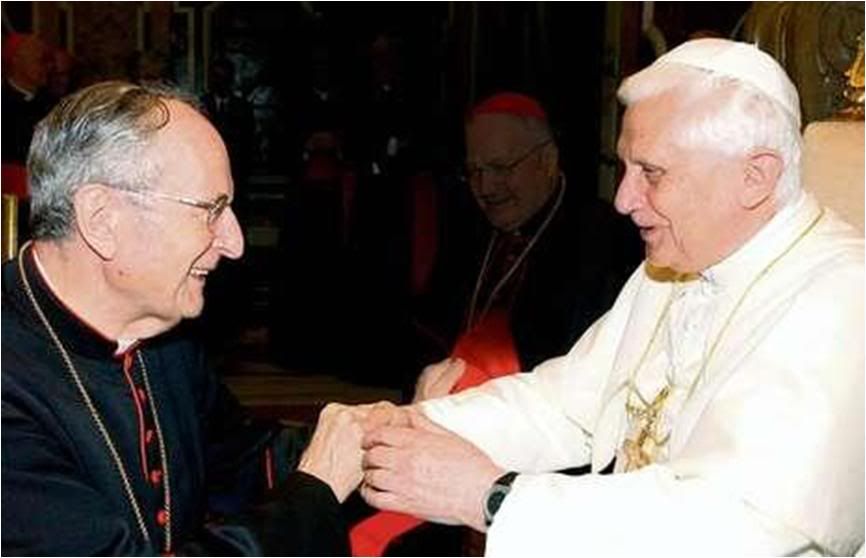 Cardinal Meisner with the Pope on April 22, 2005.
Cardinal Meisner with the Pope on April 22, 2005.
Dear Holy Father!
Today, April 16, you will mark your 83rd birthcay, and three days later, the sixth year of your Pontificate will begin.
Looking back over the five years of your Pontificate, I naturally have before my eyes your visit to Cologne for World Youth Day a few months after you inaugurated your work as the Successor of St. Peter, and your visit the following year to your Bavarian homeland.
In view of the many attacks and the gloating that for some time has beset our Church and especially your person, it might seem that in the meantime, there is a totally different attitude towards you – no longer ‘Wir sind Papst’. But you surely must know that many many people in Germany - above all, in the Church here in our country - are as happy as they have been to have a Pope like you!
You know that the accusation of wanting to turn the Church back to before the Second Vatican Council is downright ridiculous, especially since you are, more than ever, one of the few still living eyewitnesses to this important event, at which you worked as a theological expert with my predecessor Cardinal Frings.
We bishops also must thank you especially because you have brought about a new style of brotherly collegiality. You have called us not only to Bishops’ Synodal assemblies, but you have alro written us enlightening letters on important events.
Above all, countless men consider themselves richly gifted with your words and your writings like Deus caritas est but even with works you wrote before 2005!
I can still remember being with you at your home a week before your election: You were at your desk, almost hidden behind a giant pile of pending documents that your saintly predecessor was no longer able to work upon. A mountain of documents to be quarried, representing the burden of responsibility. At that time, I really felt very sorry for you.
With your election as the Successor of Peter, the responsibility grew far greater, but obviously, God’s mercy also grows. “Our joy in the Lord is our strength” – in you, we experience these Biblical words.
That is why not just the bishops and not just Germans feel bound to you with familiar warmth. From this spiritual communion, we send you our best wishes and promise you our continuing prayers.
Since your first visit as Pope to our cathedral, when you extolled Cologne, and since Cologne residents have never had an inferiority complex, we feel justified to say, as they said in medieval times, “Cologne is the ever-loyal daughter of the Holy Roman Church”. Especially so on your feast days!
In warmest communion, I greet you on your birthday.
+JOACHIM CARDINAL MEISNER


Also from today's BILD:
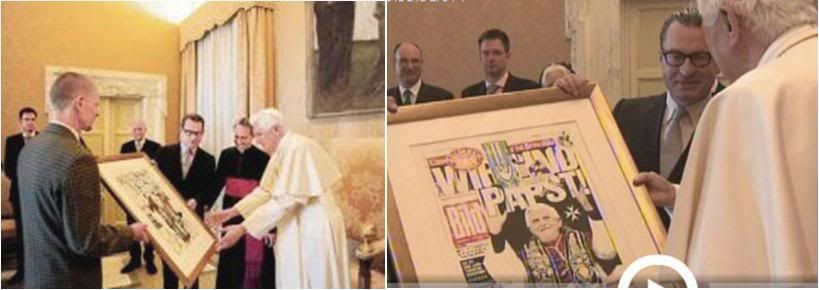
Berlin collage artist Lenzner, who created a pop art lithograph based on Bild's WIR SIND PAPST 2005 headline, presented one of the lithographs to the Holy Father after the GA last Wednesday.
The Pope's birthday featured on a front page that leads off with the literal volcanic ash fallout from Iceland and the resulting chaos on all flights in Europe.

The Marktl schoolchildren on the video singing a birthday greeting for the Pope in front of the natal house:
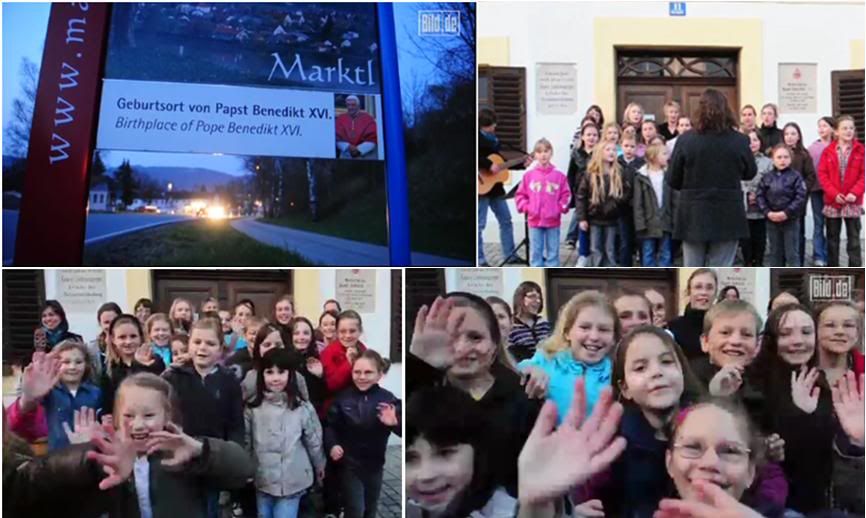

[Modificato da TERESA BENEDETTA 17/04/2010 02:32] |
| |
 17/04/2010 06:48 17/04/2010 06:48 |
|
| | | OFFLINE | | Post: 19.947
Post: 2.588 | Registrato il: 28/08/2005
Registrato il: 20/01/2009 | Administratore | Utente Veteran | |
|

 Pope Benedict commends work
Pope Benedict commends work
of US-based papal foundation -
who fete him with a birthday cake

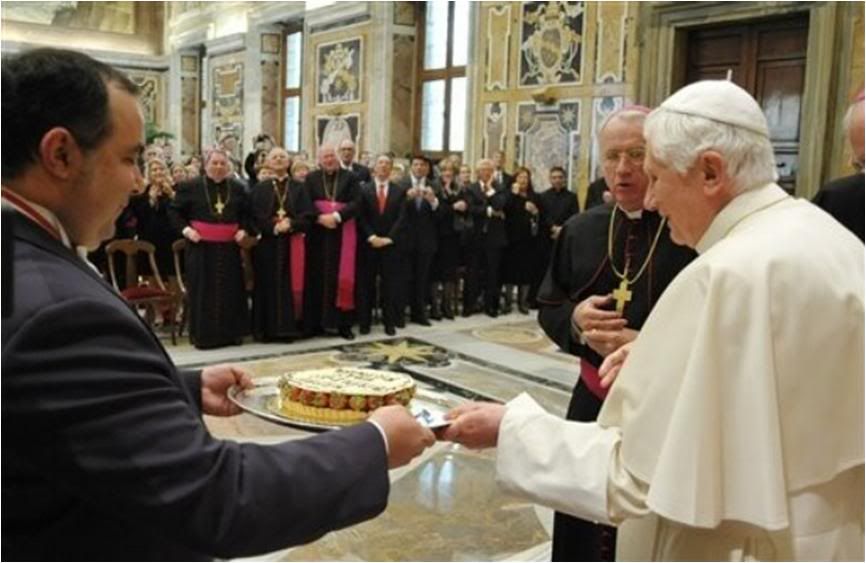
VATICAN CITY, 16 APR 2010 (VIS) - This afternoon, Benedict XVI, who turned 83 today, received members of the Papal Foundation, the United States Catholic agency founded in Philadelphia, USA in 1990 by the now-deceased Cardinal John Krol, which every year finances the needs of the Church in the world. Its current chairman is Cardinal Anthony Bevilacqua, archbishop emeritus of Philadelphia.
The news item goes on to quote excerpts from the Pope's remarks to the Foundation, but here is the full text whichwas dleivered in English:
Dear Friends,
I am pleased to greet the members of The Papal Foundation on the occasion of your annual pilgrimage to Rome. Our meeting is pervaded by the joy of this Easter season, as the Church celebrates the Lord’s glorious victory over death and his gift of new life in the Holy Spirit.
A year ago I had the grace of visiting the Holy Land and praying before the Lord’s empty tomb. There, echoing the witness of the Apostle Peter, I proclaimed that Christ, by rising to new life, has taught us "that evil never has the last word, that love is stronger than death, and that our future, and the future of all humanity, lies in the hands of a faithful and provident God" (Address at the Church of the Holy Sepulchre, 15 May 2009).
In every time and place, the Church is called to proclaim this message of hope and to confirm its truth by her practical witness of holiness and charity. The Papal Foundation has advanced this mission in a particular way by supporting a broad spectrum of charities close to the heart of the Successor of Peter.
I thank you for your generous efforts to offer assistance to our brothers and sisters in developing countries, to provide for the education of the Church’s future leaders, and to advance the missionary endeavors of so many dioceses and religious congregations throughout the world.
In these days I ask you to pray for the needs of the universal Church and to implore a renewed outpouring of the Spirit’s gifts of holiness, unity and missionary zeal upon the whole People of God.
With great affection I commend you and your families to the loving intercession of Mary, Mother of the Church, and cordially impart my Apostolic Blessing as a pledge of joy and peace in Jesus our Risen Lord.
Afterwards, the delegation presented the Pope with a birthday cake and sang 'Happy Birthday' to him.
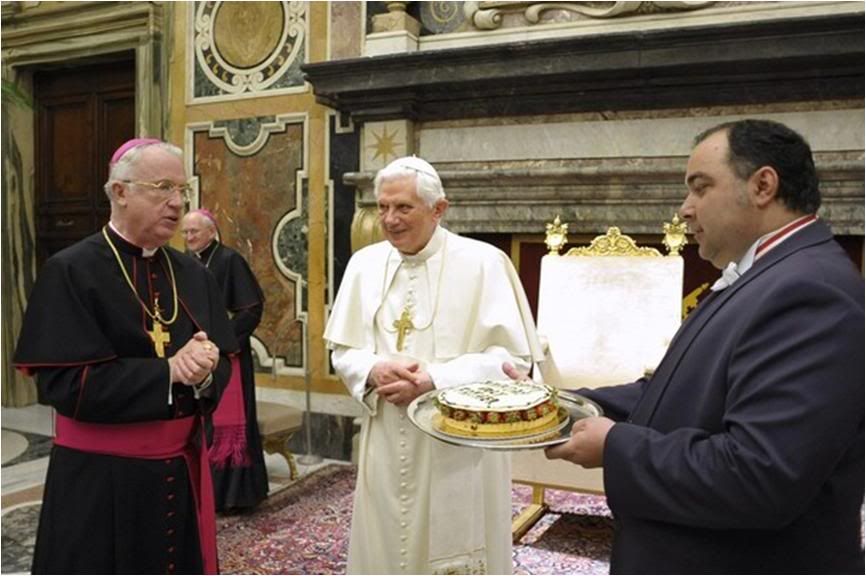
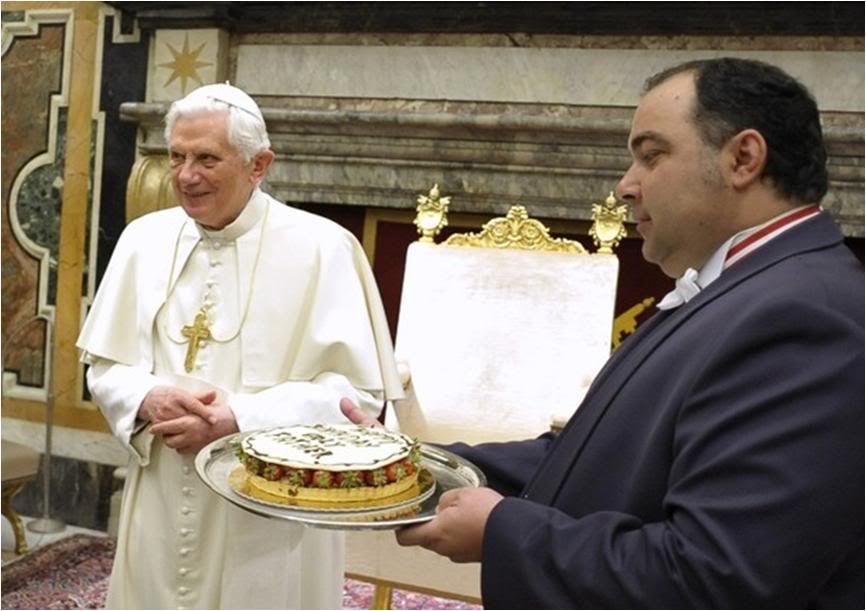
Which gives me an occasion to recall what will perhaps remain a truly unique papal birthday celebration unlikely to happen again: Pope Benedict's 81st birthday was marked by the largest White House reception yet given for a visiting head of state, with 13,000 gathered on the South Lawn of the White House to welcome him on his first US visit as Pope. After the patriotic pomp of the South Lawn ceremonies, President and Mrs. Bush presented the Pope with a huge yellow birthday cake before his formal talk with the President adn a prayer session with him and hiw wife.
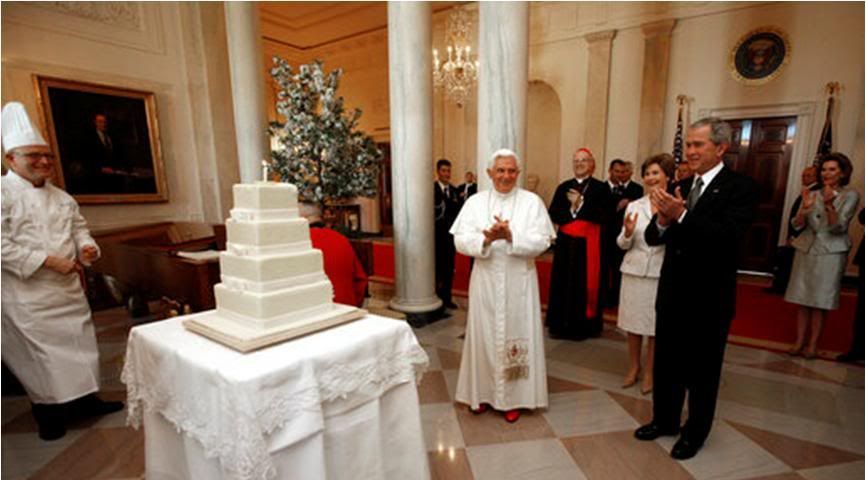
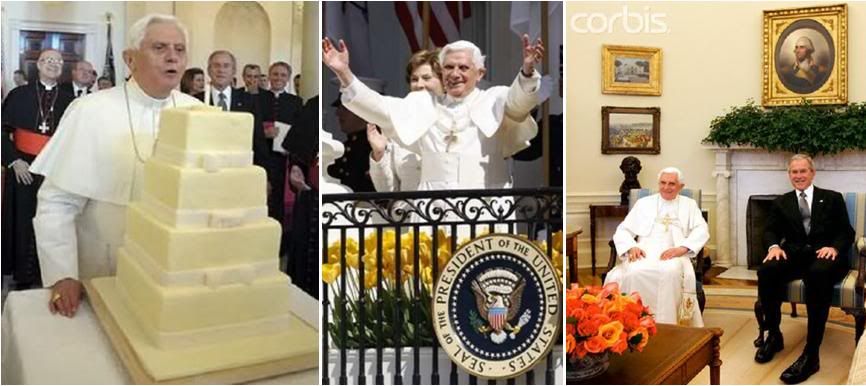
Three months later, the Pope showed his appreciation when the Bushes came to the Vatican during Bush's last swing through Europe as President. He received them in the more intimate surroundings of the Torre San Giovanni in the Vatican grounds, then strolled with them through the Gardens to the Grotto dedicated to Our Lady of Lourdes where they listened to a brief concert.
And whenever I think of the those few days that the Holy Father was here with us in the United States, it all seems like only yesterday. My heart feeds constantly on the flood of joy that surges whenever I think of the many chances I was lucky to see him and the breathless adventure of trying to avail of those chances!
But time has passed indeed - they have torn down the old building next to the Nunciature in manhattan and are bulding a new commercial center, and the old Yankee Stadium where the Pope said Mass has just been torn down to make way for a huge parking lot to serve the new Stadium across the street. But Heroes' Park stays - an odd attraction at the edge of the parking lot - with the plaques of the three Popes who celebrated Mass in 'the house that Ruth built', alongside those commemorating the Yankee legends who made baseball history.
I wonder - if the papal Foundation event had not provided a birthday cake and song, if AP would ever have bothered to note the Pope's birthday today... Oh, I get it! They still have nothing 'new' to add to their bummer of an 'exclusive' about the Kiesle case two weeks ago... My goodness, the 'mud squads' aren't doing their job, are they, shame on them!
Pope Benedict XVI turns 83,
treated to birthday cake and song
at Vatican before Malta trip

VATICAN CITY, April 16 (AP) — Pope Benedict XVI asked for prayers for the church Friday as he spent his 83rd birthday quietly working, treated to a cake but otherwise keeping to his schedule ahead of a weekend pilgrimage to Malta.
The Papal Foundation, an American Catholic fundraising organization for papal charities, presented the Pontiff with a large cake during its annual visit to Rome and sang "Happy Birthday" to him in English.
In brief remarks thanking the group for its support for missionaries and other charitable works around the world, the Pontiff made an indirect reference to the clerical sex abuse crisis buffeting the Catholic church.
"In these days, I ask you to pray for the needs of the universal church" so it might receive renewed "holiness, unity and missionary zeal," Benedict said.
The Vatican doesn't officially celebrate Popes' birthdays. But on Monday — the fifth anniversary of Benedict's election as Pope — cardinals who live in Rome will offer him a luncheon in an ornate hall of the papal palace. [Is there any hall that is not ornate in the Apostolic Palace which has been decorated by the greatest artists of the Western world???]
His doctors say the Pontiff is in generally good health for his age. But as the clerical sex abuse crisis batters the church, Benedict has been looking pale and gaunt. [Wishful thinking, destiend to be 'mi gozo en un pozo', meaning one's wish could well be like a stone falling to the bottom of a deep deep well!]
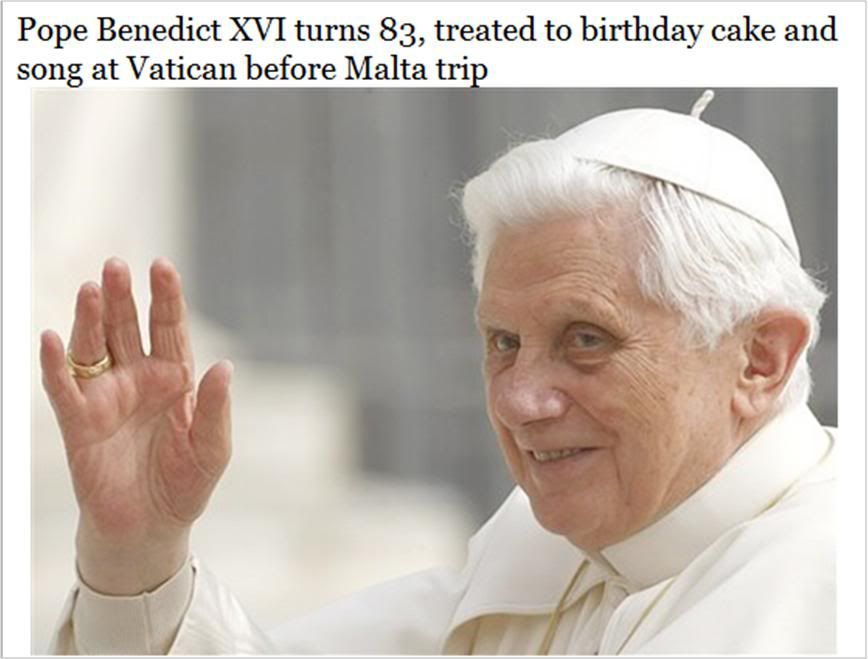 Wow! We should all look so 'pale and gaunt'! How stupid it is of the AP writer to make that uncalled-for comment when all the photos taken by the AP photographers themselves show otherwise - the very photo they used to illustrate this story, for instance. But they're counting that most subscriber news outlets using their service won't have the budget or the space to accord photos with the story, so they feel safe to claim the Pope looks pale and gaunt!
Wow! We should all look so 'pale and gaunt'! How stupid it is of the AP writer to make that uncalled-for comment when all the photos taken by the AP photographers themselves show otherwise - the very photo they used to illustrate this story, for instance. But they're counting that most subscriber news outlets using their service won't have the budget or the space to accord photos with the story, so they feel safe to claim the Pope looks pale and gaunt!
In an editorial Friday, the newspaper of the Italian bishops conference, Avvenire, offered Benedict both birthday wishes and support for "the insults and attacks" it says he has endured in recent weeks.
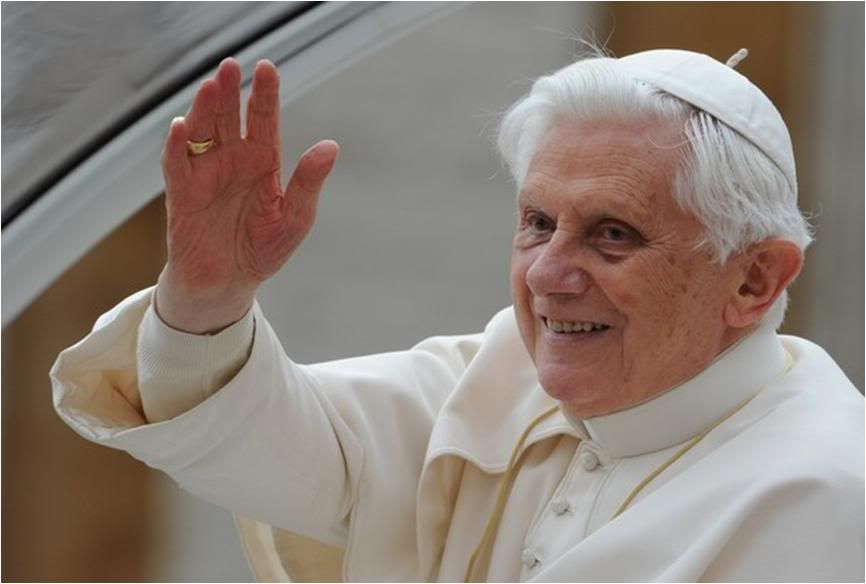 Yet another AP photo from the Wednesday GA with the 'pale and gaunt' Pope Benedict!
Yet another AP photo from the Wednesday GA with the 'pale and gaunt' Pope Benedict!
[Modificato da TERESA BENEDETTA 17/04/2010 12:37] |
| |
 17/04/2010 12:47 17/04/2010 12:47 |
|
| | | OFFLINE | | Post: 19.948
Post: 2.589 | Registrato il: 28/08/2005
Registrato il: 20/01/2009 | Administratore | Utente Veteran | |
|
 Saturday, April 17
Saturday, April 17
 ST. BENEDICT JOSEPH (Benoit Joseph) LABRE (b France 1748, d Rome 1783), 'The Beggar Saint', Patron of Pilgrims and of the Homeless
ST. BENEDICT JOSEPH (Benoit Joseph) LABRE (b France 1748, d Rome 1783), 'The Beggar Saint', Patron of Pilgrims and of the Homeless
One of the least remarked coincidences is that for years before April 16 became the feast day for Bernadette of Soubirous, it was the feast day of Benedict Joseph Labre, who died in Rome 144 years before Joseph Ratzinger was born on the same day, who would take the name Benedict XVI when he became Pope. But their life stories could not have been more different. The saint who prefigured the Pope's names is one of the most extraordinary saints in modern times. The eldest of 18 children in a prosperous family near Boulogne, he was educated by his uncle, a parish priest. But his education was not deemed suitable for him to be accepted by the Trappists, Carthusians and Cistercians. At age 16, he decided he would leave everything behind and live his life as a pilgrim, walking on foot from shrine to shrine, living on alms and sharing what little he had with other beggars - the classic 'Fool for Christ' well-known in the Orthodox traditions. He eventually based himself in Rome, where he lived in the Colosseum, and came to be known as the 'beggar of Rome' as well as 'the saint of the 48 hours' because of his devotion to adoration of the Blessed Sacrament. He was also increasingly sick due to malnutrition. One day, he dragged himself to attend Mass at Santa Maria dei Monti near the Colosseum. He collapsed in the church and was taken to a nearby home where he died. He was only 35. At the news of his death, children in the neighborhood went around shouting 'The saint is dead!' His wake at Santa Maria dei Monti lasted through the rest of Holy Week, attracting throngs of Romans. His cult was immediate, and within a year, he was being written about as far as London, and his confessor had written a biography of him, in which he recounts at least 136 miraculous cures in the first three months after he died. He was beatified in 1869 and canonized in 1881. His remains are venerated in Santa Maria dei Monti.
Readings for today's Mass: www.usccb.org/nab/readings/041710.shtml
OR today.
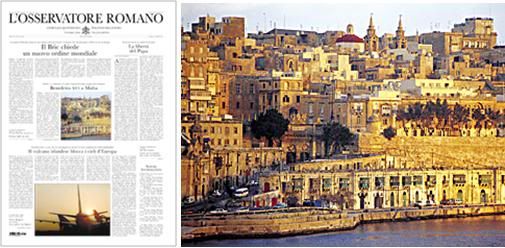
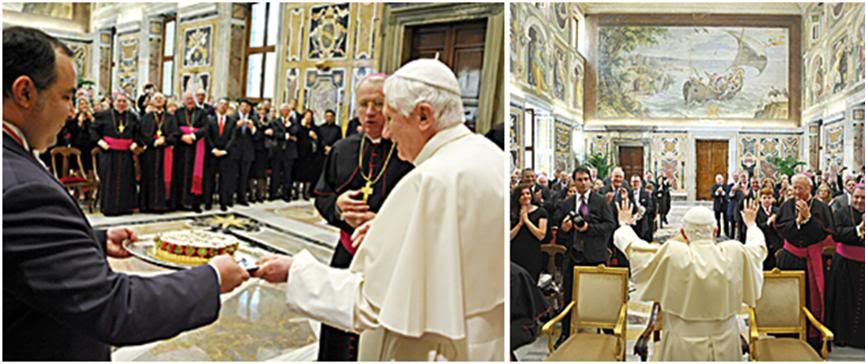
There's a Page 1 editorial commentary on the first five years of the Benedictine Pontificate; a brief item about teh Pope's departure for Malta today, and an account of his remarks to the US-based Papal Foundation, which presented him with a birthday cake after members and their families met him yesterday on their annual pilgrimage to Rome. Other Page 1 stories: Brazil, Russian, India and China (the BRIC nations, which have become a formidable pillar of the world economy, end a summit in Brasilia and demand a new world financial order; and a story about the unprecedented logistical and economic consequences to Europe of the ongoing volcanic eruption in Iceland.
THE POPE'S DAY
The Pope was to leave Rome at 3:25 p.m. for a 26-hour apostolic trip to Malta, his 14th trip abroad as Pope
and his first of five scheduled foreign travels in 2010.
[Modificato da TERESA BENEDETTA 17/04/2010 17:32] |
| |
 17/04/2010 13:24 17/04/2010 13:24 |
|
| | | OFFLINE | | Post: 19.949
Post: 2.590 | Registrato il: 28/08/2005
Registrato il: 20/01/2009 | Administratore | Utente Veteran | |
|

 Facing stormy seas,
Facing stormy seas,
Pope heads to Malta
to recall a shipwreck
by John L Allen Jr

April 16, 2010
ROME - Benedict XVI arrives in Malta tomorrow to celebrate the memory of a shipwreck, and at the moment the Pope could be forgiven for feeling like he’s on the brink of another one. In recent weeks, the “Barque of Peter,” a traditional maritime image for the papacy, seems to be foundering on the choppy seas of the sex abuse crisis. [Cheap facile metaphor to reinforce MSM's 'idee fixe et folle' that the Church is 'undergoing its worst crisis ever'. Allen generally does not mind hyperbole to exploit a metaphor to its limits.]
Benedict may well be hoping the Maltese show him the same “rare humanity” with which the Acts of the Apostles say they received St. Paul almost two millennia ago.
The official motive for Benedict’s trip is to mark the 1,950th anniversary of Paul’s famous shipwreck on Malta while en route to Rome, an accident that led to the early Christianization of the Maltese archipelago and Malta’s emergence as one of the most homogenously Catholic cultures on earth.
To this day, divorce is illegal, the EU has acknowledged Malta’s right to set its own policies on abortion, and the Catholic church is constitutionally recognized as the authoritative teacher of right and wrong in the country.
Not long ago, Benedict’s Maltese weekend thus loomed as a break from the storms besieging his papacy. In some ways, that’s still likely to be the case: The Pope’s crowds should be large and enthusiastic, and absolutely no one in this country of 400,000, which is 94 percent Catholic, has suggested serving Benedict with an arrest warrant when he steps off the plane.
Yet even in this land of one church for every 1,000 residents, where members of parliament still kiss a crucifix upon taking office, the shadow of the sexual abuse crisis hangs over Benedict’s brief visit.
Papal trips are generally carefully choreographed affairs, but at the outset of this April 17-18 journey one major bit of drama concerns whether Benedict will break from his pre-planned itinerary to add a meeting with victims of sexual abuse.
Doing so would arguably not only be good PR for the Pope [as if PR has ever influenced what Benedict decided], but it would have strong local resonance.
Malta, like so many other parts of the Catholic world, has recently been rocked by a sex abuse scandal – in this case, a scandal centering on an orphanage where ten men say they were abused by Catholic priests in the 1980s and 1990s.
Several of those men have asked for a meeting with the pope in order to close what they describe as a “hurtful chapter.”
Malta was recently served a shocking reminder of the possible fallout of that hurt when a 46-year-old named Gaetano Scerri, who recently completed a 20-year prison sentence for killing a man with a hammer in 1991 and then cutting his body to pieces with a broken bottle, linked that horrific crime to abuse he suffered at St. Joseph orphanage in Santa Venera.
Scerri recently told a newspaper reporter that the “the abuse, the rapes and the beatings” he suffered at the hands of priests at the orphanage “made me a pitiless person, full of rage.”
Inevitably, the recent drumbeat of critical attention to the Pope’s record on sex abuse cases, in tandem with the local crisis in Malta, have produced some local push-back to the Pope’s trip. Last week, a few posters were defaced by someone who painted Hitler moustaches on the pope’s face and added the word “pedophile.”
The Vatican spokesperson, Jesuit Fr. Federico Lombardi, said earlier this week that in principle Pope Benedict wants to meet victims, but that his time is limited in Malta and that journalists should not create “great expectations” of a meeting.
“The general approach is that these meetings must be done calmly and intentionally, to create an atmosphere of discretion and reflection, not under media pressure,” Lombardi said. “There must be the possibility of listening and personal communication.”
Recently, the Maltese church presented the first picture of sex abuse within its ranks, announcing it had received 84 allegations of child abuse allegedly involving 45 priests over the past decade.
Aside from the possibility of a meeting with victims, the world will also be watching to see if Benedict XVI addresses the sex abuse crisis, even indirectly, in his prepared remarks or in any off-the-cuff comments.
Earlier this week, Benedict made his first allusion to the crisis since his pastoral letter to Ireland in mid-March.
“We Christians, even lately, have often avoided the word ‘penance,’” the pope said during a Mass in the Pauline Chapel this week, according to excerpts from his homily posted on Vatican Radio’s Web site.
“Now, under the attacks of the world that speak of our sins, we see that doing penance is grace and we see how penance is necessary,” he said.
This weekend’s outing is Benedict’s fourteenth foreign voyage, and his eighth to Europe. Part of the reason for that, of course, is simply that Rome is in Europe, and it’s easier to travel within the continent.
In part, however, it also reflects a strategic priority of Benedict’s papacy, which is the struggle against secularism and what he once memorably defined as a “dictatorship of relativism” in the West, above all Europe.
In decades past, the Church’s fight against secularism in Malta was a full frontal war. During most of the 1960s, members of the left-leaning Labor Party were officially excommunicated for trying to revoke some of the traditional privileges of the Church.
Today the battle is waged more on a cultural level rather than through formal interdict, but it’s no less fierce; in 2008, Archbishop Paul Cremona compared the battle against secularism to Malta’s earlier resistance to the Turks and the Fascists.
Though Malta is still a Catholic stronghold, there are signs that secularism is nonetheless gaining ground.
In 2005, a Church-run institute published the results of a census analyzing Mass attendance figures over the years. The results showed a considerable drop, with weekly Mass attendance rates falling from 72.7 percent in 1982 to 50.7 percent in 2005. In 1967, by way of comparison, the rate stood at almost 82 percent.
If you do the math, the drop from 1982 to 2005 works out to almost ten percent every decade, or one percent a year. Though demographers usually caution that straight-line projections are dangerous, if that trend continues at its present pace, regular church-goers could find themselves a minority in Malta as early as 2015. That would amount to a remarkable social evolution in a relatively brief arc of time.
A survey carried out by the Malta Today newspaper also found a steady drop in opposition to legal divorce over the last fifteen years. According to an October 2008 poll, the Maltese are fairly even divided, with 50.2 percent opposed to introducing divorce and 46 percent supporting it. Yet a survey held by TV program “Xarabank” one month later showed a wafer thin majority (50.4 percent) in favor of divorce.
Significantly, the Malta Today survey showed that support for legal divorce is highest in the 18-34 age group, while opposition peaks among those older than 55 – an indication, perhaps, of which way the social winds are blowing.
A similar generational fault line seems to run through attitudes towards same-sex marriage. A Malta Today poll in 2007 found that 54 percent of Maltese under 34 favor same-sex marriage, while 82 percent of those over 55 oppose it.
The October 2008 poll also showed strong minorities or majorities favoring a host of other social measures the church opposes, including euthanasia for terminally ill patients and education on condoms and other means of birth control in Maltese schools. On the other hand, abortion is strictly illegal in Malta, and almost two-thirds of Maltese said they support that ban.
The Maltese themselves seem divided about the contemporary relevance of the country’s Catholic heritage.
Dominican Fr. Mark Montebello, a controversial priest with a high media profile, argues that while Malta has retained the visible trappings of its Catholic identity, on the ground the plates are shifting in favor of secularism.
“All that remains for the majority of the Maltese people is the folkloristic substance of the Catholic Church: its initiation rites, its colorful processions and liturgies, its exuberant religious feasts, and the like,” Montebello said. “All of these seem to have become mostly unrelated to any act of belief or profession of faith.”
(For the record, Montebello has been repeatedly reprimanded by the Maltese province of the Dominicans and other officials for expressing positions out of line with church teaching.)
On the other hand, a chief justice emeritus of Malta’s Constitutional Court recently defended the country’s Catholic heritage in a fashion that would likely make Benedict XVI smile.
“The Catholic Church in Malta has, since time immemorial, been the expression of the spiritual values of the people,” said Giuseppe Mifsud Bonnici. “No doubt, a break away from that position will, I believe, bring about a substantial lowering of values which are not easily replaced.”
During a Vatican press briefing earlier this week, Lombardi said that immigration would also be an important them for Benedict XVI during his weekend in Malta.
The Maltese bishops have been struggling to stem a rising tide of anti-immigrant resentment. Cremona recently called upon his countrymen to “eliminate prejudices and consider the immigrants as persons,” arguing that the welcome shown to St. Paul “must be conserved and practiced in the current historical moment,” especially with respect to the waves of illegal immigrants from Africa who wash up on Malta’s shores.
Because of its Mediterranean location, Malta is a gateway to Europe, and thus a popular point of arrival for immigrants from various parts of the world. In 2005 alone, an estimated 1,800 illegal immigrants reached Malta by boat, a stunning number for a county of just over 400,000 people.
A recent report found that every one illegal immigrant in Malta represents the equivalent of 1,129 in Germany and 1,749 in France, meaning that proportionately Malta has one of the largest populations of undocumented immigrants in all of Europe.
Beyond the challenge of trying to provide accommodations for this wave of new arrivals, Malta also shoulders a disproportionate share of the European burden for executing seaborne rescues. The territory for which Malta is responsible for search and rescue is as large as that of the entire United Kingdom.
In a reflection of Malta’s unique situation, the European Union has chosen the island nation to host the European Asylum Support Office, essentially a legal resource center for immigrants claiming asylum in Europe.
Massive waves of immigrants have, inevitably, produced anti-immigrant blowback, especially since Malta tries to market itself to Europe and the rest of the world as a prosperous, upscale tourist destination. Far-right political movements are growing in the small nation, and Maltese anthropologist Mark Anthony Falzon says that illegal immigration has stirred “racist feelings” in the population.
In one sign of the tension surrounding immigration issues, Maltese journalist Herman Grech had to be provided with police protection after he publicly suggested that racist attitudes are behind some of the anti-immigrant sentiment in the country. Italian journalist Rolla Scolari has accused Malta of being “the most racist country in Europe.”
Generally speaking, the Catholic Church has taken a strongly pro-immigrant position, both in Malta and in other parts of the world. Aside from basic matters of social justice, that’s also because a substantial share of immigrants reaching Europe today are Africans, who usually bring a vibrant religiosity that stands in stark contrast to Europe’s dominant secular culture.
Benedict XVI is expected to echo the call for welcoming immigrants in his remarks over the weekend.
All the dire statistics cited about the increasing hold of secularization in Malta must be taken in the light of the small size of Malta. Its total population of less than 500,000 is that of a medium-size Eucropean city. Any trend is bound to be more widespread and general the smaller your population base is - an economy of scale applies.
STATISTICS FOR THE CATHOLIC CHURCH IN MALTA
Statistics updated to 31 December 2008 from the Central Statistical Office of the Vatican:
- Malta, the capital city of which is Valletta, has a population of 443,000 of whom 418,000 (94.4 percent) are Catholic.
- 2 ecclesiastical circumscriptions and 85 parishes.
- 9 bishops, 853 priests, 1,143 religious, 43 lay members of secular institutes and 1,231 catechists.
- Minor seminarians number 269 and major seminarians 91.
- A total of 17,786 students attend 80 centres of Catholic education, from kindergartens to universities.
Other institutions belonging to the Church or run by priests or religious in Malta include:
- 24 homes for the elderly or disabled
- 26 orphanages and nurseries
- 9 family counselling centres and other pro-life centres
- 24 centres for education and social rehabilitation
- 4 institutions of other kinds.
Awaiting Pope Benedict in Mzlta
by ANNA ARCO

April 16, 2010
Last year Lady Gaga – a pop singer with a penchant for outrageous outfits and bizarre expressions – drew some 40,000 people to the Granaries in Floriana, a town outside Valetta. This year, Pope Benedict – on his first Papal visit since reports of clerical child abuse began to surface in January – is expected to draw only 30,000 people in Europe’s most Catholic country.
The tide of secularisation is washing up on the shores of the Pauline island. And 1,950 years after St Paul was shipwrecked on Malta, the successor of Peter is no longer assured a wholly positive welcome when he lands later today.
Much has been made of the fact that some of the posters announcing Pope Benedict’s visit were defaced with Hitler moustaches and obscene graffiti. Like the rest of the world, Malta has been rocked by its own cases of clerical child abuse and the victims (10 men who say they were abused by priests) demand an audience with the Pope.
Malta’s bishops have condemned the abuse of children by priests and the Archbishop of Cremona has met with the victims ahead of the Papal visit.
A day ahead of the Papal visit, we tour around the island. Our guide, Clive, dismisses the graffiti on the papal posters and billboards. “It shows that we are liberal here on Malta,” he says with a shrug.
There are Papal flags hanging alongside Maltese flags in the streets of Rabat, home to the Grotto of St Paul and the seminary where Pope Benedict will be staying during his 24 hour visit,
Posters of the Holy Father decorate the windows of the loggias facing the streets in Rabat, historic Mdina, Floriana and Valletta. In St Julian, the part of the island which hosts the casinos, five-star hotels, the nightlife and much of the tourism, it is less evident that we are on the eve of the Pope’s visit in an ultra-Catholic country.
But it is clear also, from conversations with Clive, that the times are changing. Catholicism is an ever more cultural phenomenon. Young people, he says, are still attached to their village church, which is still the centre of social life in the towns, where the young meet.
He talks about the customs of Malta, where villagers belong to different clubs which compete to have the most elaborate processions on the feast days of their patron saints, which he says is still very much alive. He says the young however have different interests and that they were not attending Mass as much as they used to.
While Malta still has one of the highest pro capita Mass attendance rates in Europe with something like 50 per cent of the population attending, this is a far cry from the levels of Mass attendance 30 years ago.
It is nine years since 2001 when Pope John Paul II beatified Fr George Preca, Ignatius Falzon, and Sister Maria Adeodata Pisani in Floriana.
At the time he said: “At the dawn of a new millennium, the Church looks to you, Malta, to be still more ardent in living your apostolic and missionary vocation! The whole Church looks to you!”
At the home of the Society for Christian Doctrine, founded by St George Preca, one of the lay members of the society explains that in Malta more and more young people are leaving the Church.
Ahead of the Pope’s visit he sounds a cautious note. Would there be lots of people turning up at the Mass on Sunday in Floriana, did he think?
He says: “Yes, but fewer than did for Pope John Paul II. But I think there will be many people. They weren’t that for the visit to begin with but enthusiasm has been growing slowly. You know, the Pope is a gentle and wise man, but public perception has been quite negative. But hopefully people are getting excited about the visit.
The whole Church looks to Malta this weekend to see what it will bring.
[Modificato da TERESA BENEDETTA 17/04/2010 13:25] |
| |
 17/04/2010 13:44 17/04/2010 13:44 |
|
| | | OFFLINE | | Post: 19.950
Post: 2.591 | Registrato il: 28/08/2005
Registrato il: 20/01/2009 | Administratore | Utente Veteran | |
|
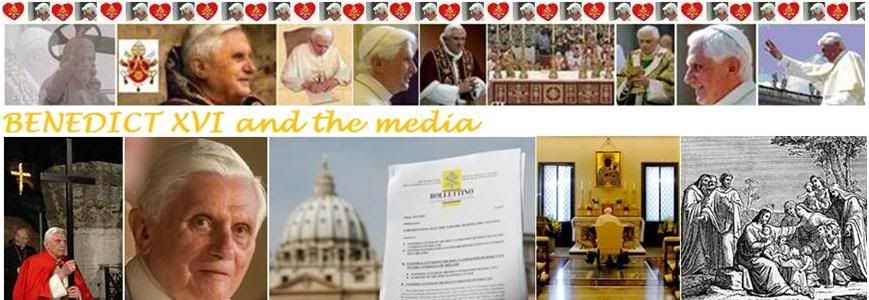 Having attempted to go for the kill - of Benedict XVI's personal character, reputation and moral authority - with its ill-advised and clearly unresearched story on the Kiesle case, the AP now has a MASSIVE vested interest in trying to prove itself right against all odds - so in that malevolent mindset, it sets the tone for MSM in its wrap-up of BenedictXVI's first five years as Pope. I am posting it for the record - it is an entire fabric woven in extreme bad faith, to say the least.
Pope Benedict XVI: Five years in,
Having attempted to go for the kill - of Benedict XVI's personal character, reputation and moral authority - with its ill-advised and clearly unresearched story on the Kiesle case, the AP now has a MASSIVE vested interest in trying to prove itself right against all odds - so in that malevolent mindset, it sets the tone for MSM in its wrap-up of BenedictXVI's first five years as Pope. I am posting it for the record - it is an entire fabric woven in extreme bad faith, to say the least.
Pope Benedict XVI: Five years in,
not the 'breather' the Vatican hoped for

VATICAN CITY, April 16 (AP)- Soon after becoming pope, Benedict XVI flew to Germany to keep a promise to attend a church youth festival. Upon arrival, strong winds blew off his skull cap. The same day, on a boat bringing the pope down the Rhine, gusts toppled a cross from the bow, breaking one of its arms.
In retrospect, not an auspicious beginning.
Benedict, elected as an "interim pope" by cardinals seeking a breather after nearly three decades of the charismatic John Paul II, is now marking five years as a successor to St. Peter. But the anniversary of his election on April 19, 2005 is clouded by a worldwide sex abuse scandal that touches Benedict himself, follows earlier controversies involving ties with Islam, and is causing the gravest crisis to hit the church in recent times.
The first German pope of the modern era took the helm of the Catholic church after 24 years in the backroom of power with a clear design: to make its 1.1 billion member flock more in line with church teaching even at the cost of shedding members and without catering to the mass media.
But since a 2006 speech in which Benedict angered Muslims by appearing to suggest the prophet Muhammad spread a message of violence, the papacy has been marked by missteps, mismanagement and media disasters.
Benedict, who turned 83 on Friday, is seeing his very legacy threatened as his own actions as bishop and cardinal have come under question. The pope has come under suspicion of trying quash investigations into pedophile priests during the time he ran the Congregation of the Doctrine of the Faith, the Vatican's guardian of church discipline and orthodoxy.
In perhaps the biggest irony, the sex abuse scandal is one Benedict inherits from his charismatic and immensely more popular predecessor, John Paul II.
The Polish pontiff is now widely seen as dragging his feet on eliminating sex abuse from the church, presiding over a system where even notorious pedophile priests were allowed to retain their parishes, or were transferred to serve in other countries.
Benedict almost immediately took a hard stand on sex abuse when he become pope five years ago. He is credited with removing a prominent Mexican cleric – a favorite of John Paul's – from power following decades of allegations that he abused seminarians.
Story continues below Many of Benedict's woes stem from his chronic inability to manage his message, a weakness perhaps rooted in his career as an academic with extremely limited experience handling a flock. Even staunch defenders acknowledge communications problems.
"Let's be clear. Everyone has communications problems. One could do better," Giovanni Maria Vian, editor of the Vatican's daily newspaper, L'Osservatore Romano, told reporters in Rome about communication problems at the Vatican.
But Vian also stressed that the pope still enjoys the full support of his collaborators and has been undeterred by the sex abuse maelstrom.
"They say the pope is alone, that the Vatican is a nest of snakes," Vian said. "It's obvious that in such a big world there are different sensibilities. But with all tranquillity and serenity, the Curia is with the pope. There are no unfaithful servants."
While Benedict has made clear he doesn't see the papacy as a popularity contest, he did put John Paul on the fast track toward sainthood after a popular "Santo Subito" (Sainthood Now) movement took root at his funeral.
Benedict's tougher stance against abusers started in the latter years of his tenure at the Congregation. Looking back, John Paul appears to have been more reluctant to follow up on abuse accusations against priests based on his experiences in his native Poland under communism, where the regime used such allegations when it sought to discredit clerics.
John Paul has been accused of letting his appreciation for the discipline, fundraising prowess and conservative bent of the Legionaries of Christ get in the way of an investigation into decades-old allegations that its Mexican-born founder had sexually abused young seminarians.
Benedict had been thwarted in his efforts to pursue a church trial against the Rev. Marcial Maciel during John Paul's papacy. Upon assuming the papacy, Benedict moved against Maciel, ordering him to live a life of reserved prayer while also launching an investigation into the order itself.
The first serious whiff of trouble in the Benedict papacy came during a visit to his native Bavaria in September 2006, when the former theology professor addressed academics at Regensburg University, where he used to teach.
There he quoted the words of a Byzantine emperor, saying: "Show me just what Mohammed brought that was new, and there you will find things only evil and inhuman, such as his command to spread by the sword the faith he preached."
While Benedict's aides explained he was only looking to establish common principles on which to build a dialogue, Muslims expressed outrage. The remarks forced Benedict to backtrack, and nearly jeopardized a trip to heavily Muslim Turkey.
Benedict has made several gestures to conservative, traditional-minded Catholics, finding himself again under fire on each occasion.
In one bow to the right in his church, he allowed wider use of the Old Latin Mass but was criticized by Jews because it revived a Good Friday prayer calling for their conversion.
Then, seeking to end a schism, he lifted John Paul's excommunication of four ultraconservative bishops – one of them a Holocaust denier. After protests from Jews, German Chancellor Angela Merkel, and even members of his church, he acknowledged mistakes and conceded that the bishop's views on the Holocaust were readily available on the Internet had anybody at the Vatican bothered to check.
For Benedict, a shy man who is gracious with visitors but appears awkward when facing large crowds, John Paul was a difficult act to follow. He has written more than 40 books but worked only 15 months tending to a parish flock in the 59 years since he took vows.
He has kept up his writing as pope, with his first installment of his book on Jesus of Nazareth becoming a best seller. His stern criticism in an encyclical of the world's banking system and call for finances to be guided by ethics drew serious attention among economists.
Although he predicted he would travel little in comparison to his predecessor, a pilgrimage to Malta this weekend will be the 14th of his papacy, although he has made only one visit to Latin America – home of nearly half the world's Catholics – and has never visited his growing church in east Asia.
A 2008 visit to the United States, where he apologized for the sex abuse scandal there and met with victims, was considered a success, as was a visit to Australia the same year for another youth festival and a meeting with abuse victims.
But it is precisely his handling of pedophile priests when he was a bishop in Germany and cardinal in the Vatican that has cast a spotlight on how church authorities in Rome and around the world dealt with the rape and molestation of children by priests.
As archbishop of Munich in the 1980s, Joseph Ratzinger approved therapy for a pedophile priest who was allowed to do pastoral work. The priest was later convicted of molesting boys. His tenure at the Congregation has also come under question thanks to documents showing it took him six years to let a known pedophile priest out of the priesthood.
On the eve of his Malta trip this weekend, Benedict finally broke his silence and urged repentance.
"But now under attack from the world, which has been telling us about our sins ... we realize that it's necessary to repent, in other words, recognize what is wrong in our lives," a tired and hoarse-sounding Benedict said during an off-the-cuff homily Wednesday.
VATICAN CITY, April 17 (AP)- Soon after becoming pope, Benedict XVI flew to Germany to keep a promise to attend a church youth festival. Upon arrival, strong winds blew off his skull cap. The same day, on a boat bringing the pope down the Rhine, gusts toppled a cross from the bow, breaking one of its arms.
In retrospect, not an auspicious beginning.
Benedict, elected as an "interim pope" by cardinals seeking a breather after nearly three decades of the charismatic John Paul II, is now marking five years as a successor to St. Peter. But the anniversary of his election on April 19, 2005 is clouded by a worldwide sex abuse scandal that touches Benedict himself, follows earlier controversies involving ties with Islam, and is causing the gravest crisis to hit the church in recent times.
The first German pope of the modern era took the helm of the Catholic church after 24 years in the backroom of power with a clear design: to make its 1.1 billion member flock more in line with church teaching even at the cost of shedding members and without catering to the mass media.
But since a 2006 speech in which Benedict angered Muslims by appearing to suggest the prophet Muhammad spread a message of violence, the papacy has been marked by missteps, mismanagement and media disasters.
Benedict, who turned 83 on Friday, is seeing his very legacy threatened as his own actions as bishop and cardinal have come under question. The pope has come under suspicion of trying quash investigations into pedophile priests during the time he ran the Congregation of the Doctrine of the Faith, the Vatican's guardian of church discipline and orthodoxy.
In perhaps the biggest irony, the sex abuse scandal is one Benedict inherits from his charismatic and immensely more popular predecessor, John Paul II.
The Polish pontiff is now widely seen as dragging his feet on eliminating sex abuse from the church, presiding over a system where even notorious pedophile priests were allowed to retain their parishes, or were transferred to serve in other countries.
Benedict almost immediately took a hard stand on sex abuse when he become pope five years ago. He is credited with removing a prominent Mexican cleric – a favorite of John Paul's – from power following decades of allegations that he abused seminarians.
Story continues below Many of Benedict's woes stem from his chronic inability to manage his message, a weakness perhaps rooted in his career as an academic with extremely limited experience handling a flock. Even staunch defenders acknowledge communications problems.
"Let's be clear. Everyone has communications problems. One could do better," Giovanni Maria Vian, editor of the Vatican's daily newspaper, L'Osservatore Romano, told reporters in Rome about communication problems at the Vatican.
But Vian also stressed that the pope still enjoys the full support of his collaborators and has been undeterred by the sex abuse maelstrom.
"They say the pope is alone, that the Vatican is a nest of snakes," Vian said. "It's obvious that in such a big world there are different sensibilities. But with all tranquillity and serenity, the Curia is with the pope. There are no unfaithful servants."
While Benedict has made clear he doesn't see the papacy as a popularity contest, he did put John Paul on the fast track toward sainthood after a popular "Santo Subito" (Sainthood Now) movement took root at his funeral.
Benedict's tougher stance against abusers started in the latter years of his tenure at the Congregation. Looking back, John Paul appears to have been more reluctant to follow up on abuse accusations against priests based on his experiences in his native Poland under communism, where the regime used such allegations when it sought to discredit clerics.
John Paul has been accused of letting his appreciation for the discipline, fundraising prowess and conservative bent of the Legionaries of Christ get in the way of an investigation into decades-old allegations that its Mexican-born founder had sexually abused young seminarians.
Benedict had been thwarted in his efforts to pursue a church trial against the Rev. Marcial Maciel during John Paul's papacy. Upon assuming the papacy, Benedict moved against Maciel, ordering him to live a life of reserved prayer while also launching an investigation into the order itself.
The first serious whiff of trouble in the Benedict papacy came during a visit to his native Bavaria in September 2006, when the former theology professor addressed academics at Regensburg University, where he used to teach.
There he quoted the words of a Byzantine emperor, saying: "Show me just what Mohammed brought that was new, and there you will find things only evil and inhuman, such as his command to spread by the sword the faith he preached."
While Benedict's aides explained he was only looking to establish common principles on which to build a dialogue, Muslims expressed outrage. The remarks forced Benedict to backtrack, and nearly jeopardized a trip to heavily Muslim Turkey.
Benedict has made several gestures to conservative, traditional-minded Catholics, finding himself again under fire on each occasion.
In one bow to the right in his church, he allowed wider use of the Old Latin Mass but was criticized by Jews because it revived a Good Friday prayer calling for their conversion.
Then, seeking to end a schism, he lifted John Paul's excommunication of four ultraconservative bishops – one of them a Holocaust denier. After protests from Jews, German Chancellor Angela Merkel, and even members of his church, he acknowledged mistakes and conceded that the bishop's views on the Holocaust were readily available on the Internet had anybody at the Vatican bothered to check.
For Benedict, a shy man who is gracious with visitors but appears awkward when facing large crowds, John Paul was a difficult act to follow. He has written more than 40 books but worked only 15 months tending to a parish flock in the 59 years since he took vows.
He has kept up his writing as pope, with his first installment of his book on Jesus of Nazareth becoming a best seller. His stern criticism in an encyclical of the world's banking system and call for finances to be guided by ethics drew serious attention among economists.
Although he predicted he would travel little in comparison to his predecessor, a pilgrimage to Malta this weekend will be the 14th of his papacy, although he has made only one visit to Latin America – home of nearly half the world's Catholics – and has never visited his growing church in east Asia.
A 2008 visit to the United States, where he apologized for the sex abuse scandal there and met with victims, was considered a success, as was a visit to Australia the same year for another youth festival and a meeting with abuse victims.
But it is precisely his handling of pedophile priests when he was a bishop in Germany and cardinal in the Vatican that has cast a spotlight on how church authorities in Rome and around the world dealt with the rape and molestation of children by priests.
As archbishop of Munich in the 1980s, Joseph Ratzinger approved therapy for a pedophile priest who was allowed to do pastoral work. The priest was later convicted of molesting boys. His tenure at the Congregation has also come under question thanks to documents showing it took him six years to let a known pedophile priest out of the priesthood.
On the eve of his Malta trip this weekend, Benedict finally broke his silence and urged repentance.
"But now under attack from the world, which has been telling us about our sins ... we realize that it's necessary to repent, in other words, recognize what is wrong in our lives," a tired and hoarse-sounding Benedict said during an off-the-cuff homily Wednesday.[Modificato da TERESA BENEDETTA 17/04/2010 13:45] |
| |
|
|
|
|